Oregon Documents
Quitclaim Deed
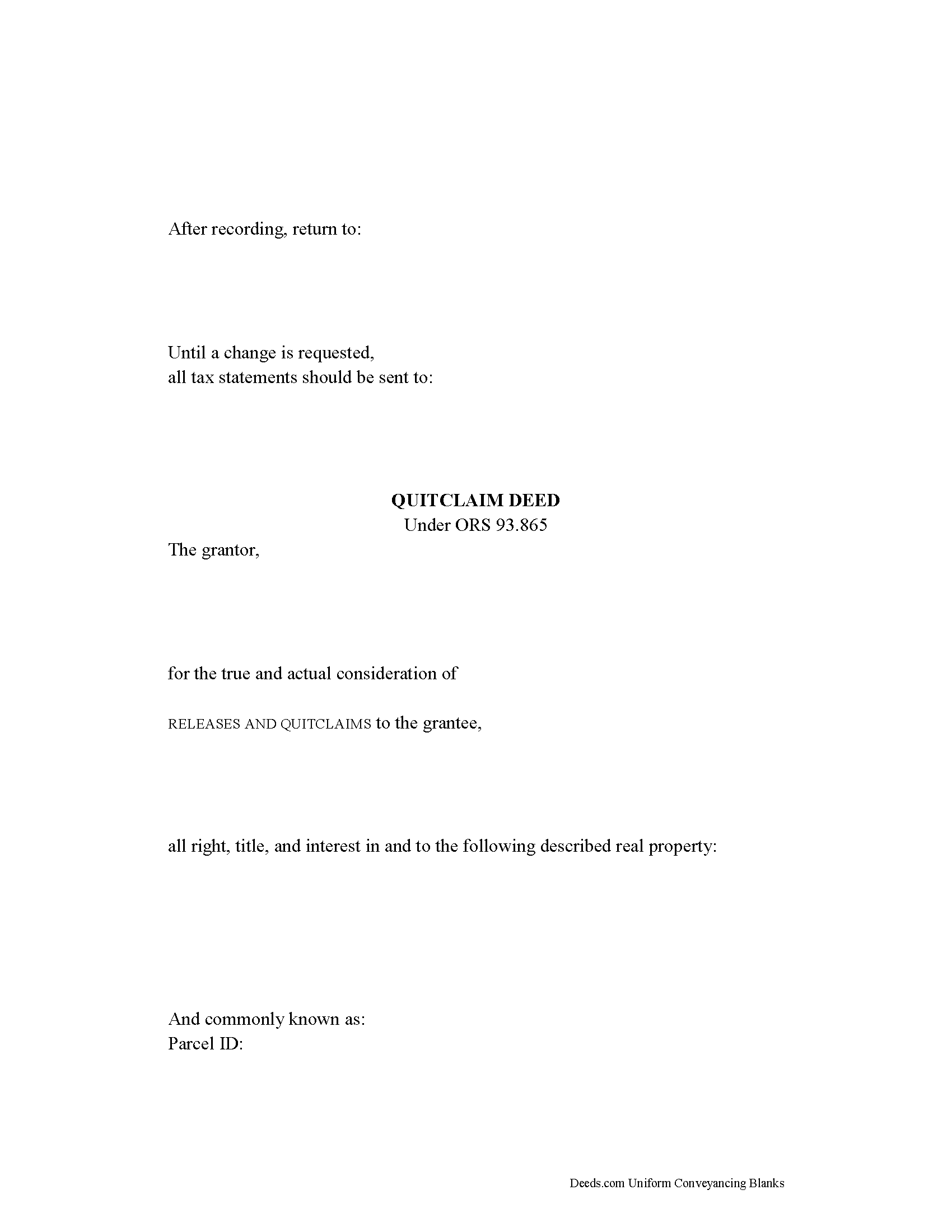
In Oregon, title to real property can be transferred from one party to another by executing a quitclaim deed. Quitclaim deeds are statutory in Oregon under ORS 93.865, and they convey real property in fee simple with no warranties of title. This type of deed only conveys the interest the grantor has at the time the deed is executed, and it does not guarantee that the grantor has good title or right to the property.
In Oregon, a lawful quitclaim deed includes the grantor's full name, mailing address, and marital status; the true consideration paid for the transfer (ORS 93.030); and the grantee's full name, mailing address, marital status, and vesting. Vesting describes how the grantee holds title to the property. Generally, real property is owned in either sole ownership or in co-ownership. For Oregon residential property, the primary methods for holding title are tenancy in common and tenancy by entirety. A conveyance of real estate to two or more unmarried persons is presumed to create a tenancy in common. A conveyance to a married couple creates a tenancy by entirety. Joint tenancy is abolished unless the conveyance is to trustees or personal representatives (ORS 93.180).
... More Information about the Oregon Quitclaim Deed
Gift Deed
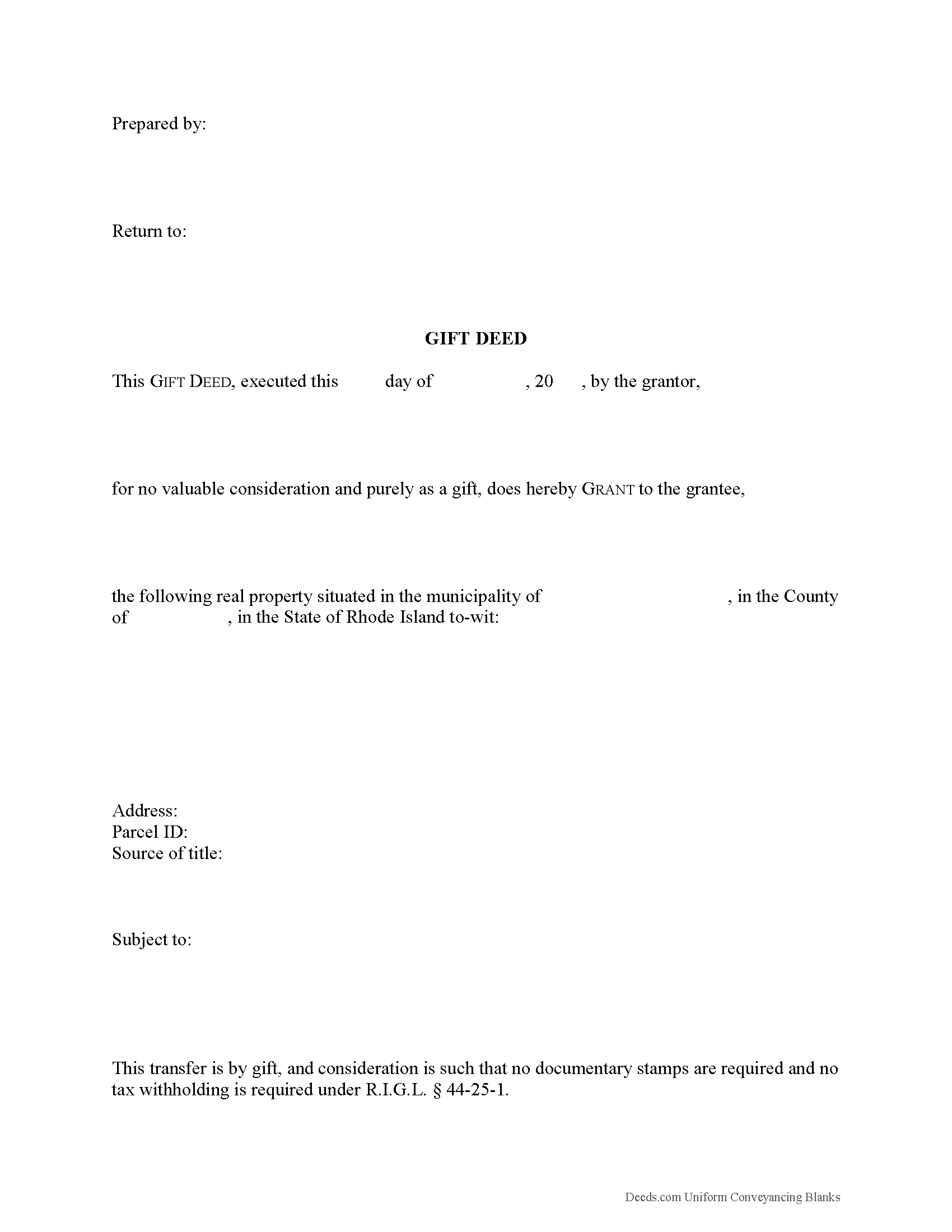
Gifts of Real Property in Oregon
A gift deed, or deed of gift, is a legal document voluntarily transferring title to real property from one party (the grantor or donor) to another (the grantee or donee). A gift deed typically transfers real property between family or close friends. Gift deeds are also used to donate to a non-profit organization or charity. The deed serves as proof that the transfer is indeed a gift and without consideration (any conditions or form of compensation).
Valid deeds must meet the following requirements: The grantor must intend to make a present gift of the property, the grantor must deliver the property to the grantee, and the grantee must accept the gift. A gift deed must contain language that explicitly states no consideration is expected or required, because any ambiguity or reference to consideration can make the deed contestable in court. A promise to transfer ownership in the future is not a gift, and any deed that does not immediately transfer the interest in the property, or meet any of the aforementioned requirements, can be revoked [1].
A lawful gift deed includes the grantor's full name and marital status, as well as the grantee's fu... More Information about the Oregon Gift Deed
Warranty Deed
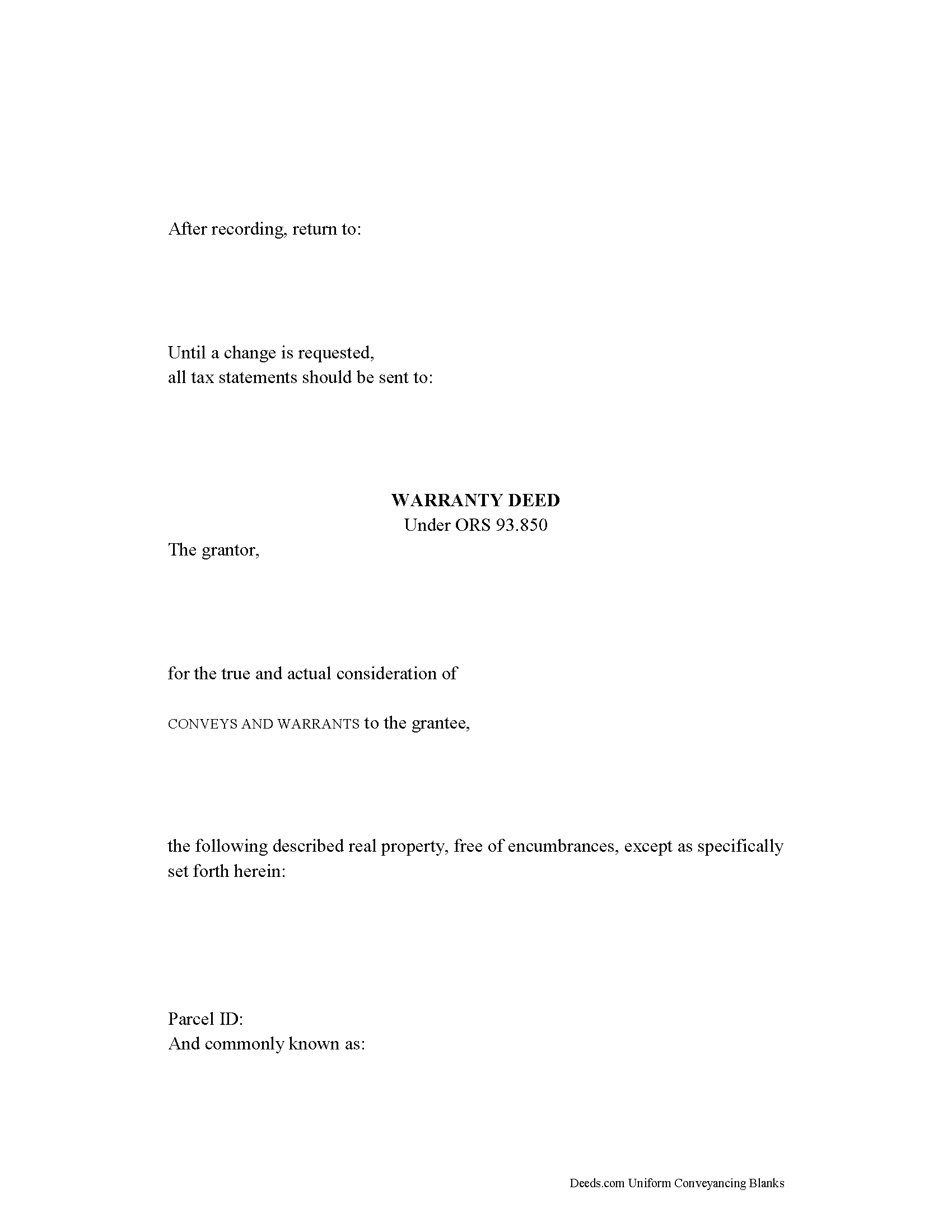
In Oregon, title to real property can be transferred from one party to another by executing a warranty deed. A warranty deed conveys an interest in real property to the named grantee with full warranties of title.
Warranty deeds are statutory in Oregon under ORS 93.850, and they convey real property in fee simple with the most assurance of title. When a warranty deed uses the statutory form, the following covenants are implied: the grantor guarantees that he or she holds title to the property and has good right to convey it; that the property is free from encumbrances (with the exception of any noted in the deed); and that the grantor will defend the title against all claims (ORS 93.850(2)(c)). If the grantor "desires to exclude any encumbrances or other interests from the scope of the covenants... such exclusions must be" noted in detail on the face of the deed (ORS 93.850(3)). This warranty of title is greater than that of a limited or special warranty deed, which guarantees the title only against claims that arose during the time the grantor held title to the property, or a quitclaim deed, which offers no warranties of title.
In Oregon, a lawful warranty deed includes the ... More Information about the Oregon Warranty Deed
Special Warranty Deed
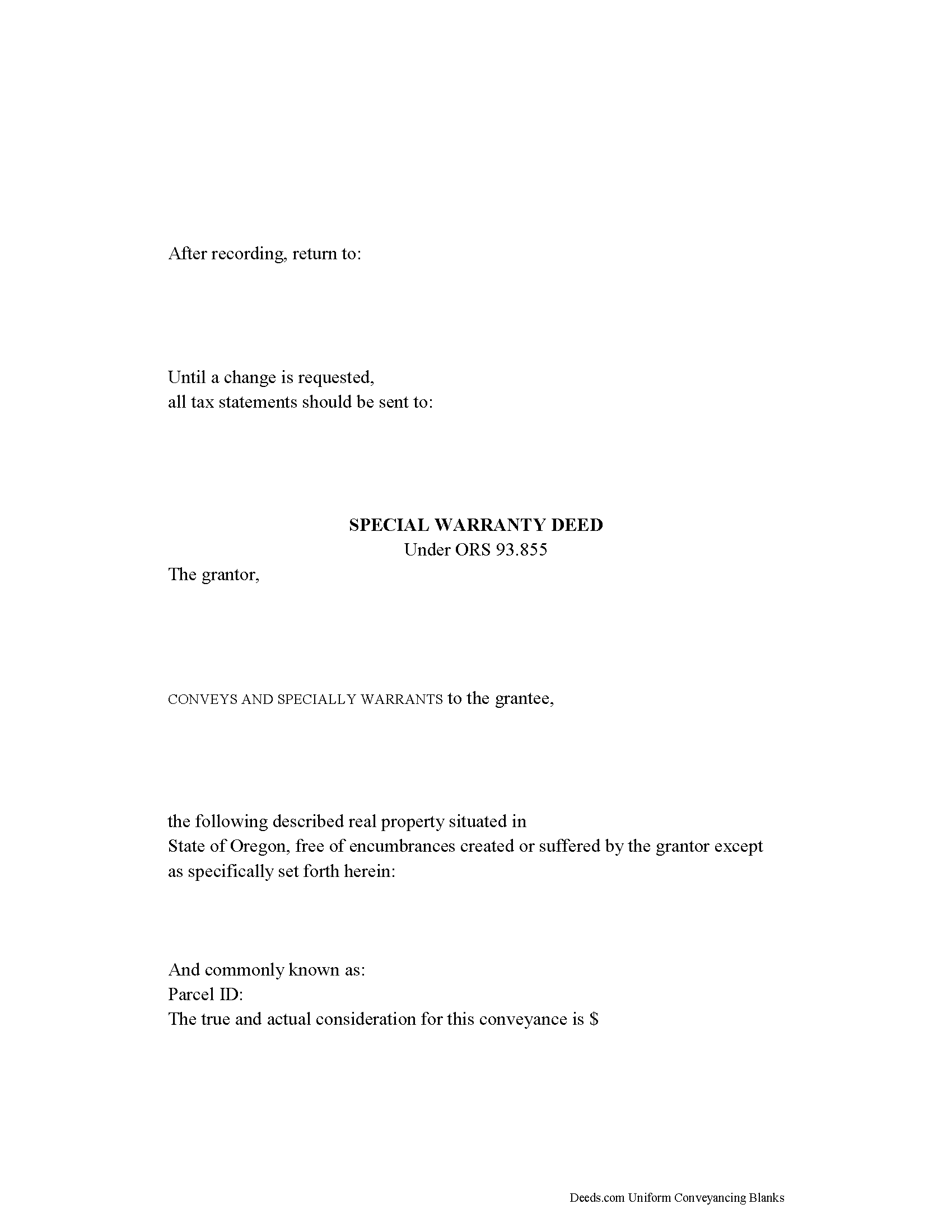
A special warranty deed can be used to convey title to real property in Oregon. A statutory form for this real estate deed is provided in ORS 93.855. A deed that is substantially in the form prescribed by statute will have the same effect as a warranty deed in Oregon, except that the covenant of freedom from encumbrances is limited to those encumbrances done or suffered by the grantor. Additionally, the covenant of warranty is limited to read "That the grantor warrants and will defend the title to the property against all persons who may lawfully claim the same by, through, or under the grantor." If the grantor in a special warranty deed wants to exclude any encumbrances or other interests from the scope of the covenants, such exclusions must be expressly set forth in the deed (93.855). The statutory form for a special warranty deed is not mandatory. Other forms are permissive and may be used for a conveyance of real property.
Before a special warranty deed can be considered for recordation by a county clerk, it is required to be signed by the grantor and acknowledged before any judge of the Supreme Court, circuit judge, county judge, justice of the peace, or notary public with... More Information about the Oregon Special Warranty Deed
Bargain and Sale Deed
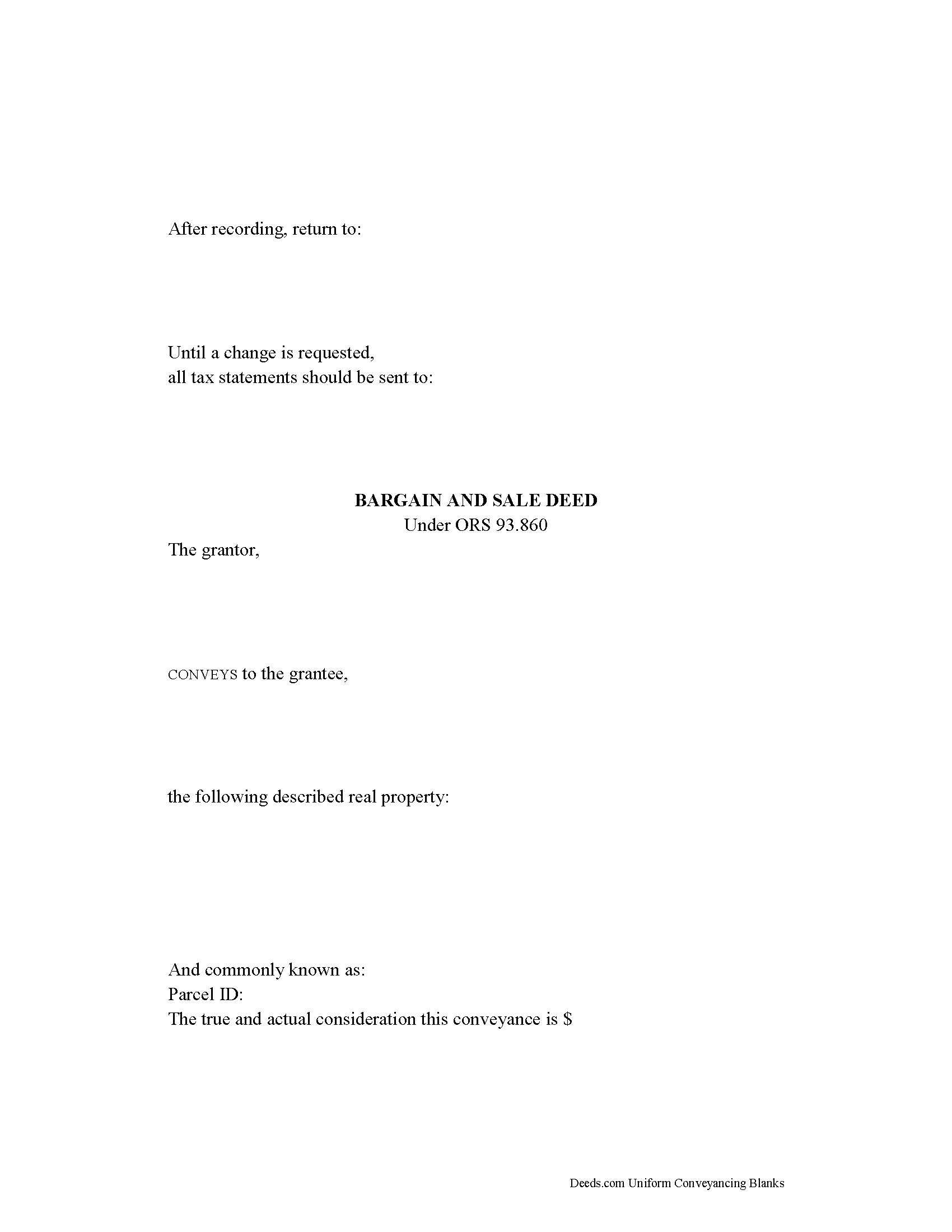
In Oregon, title to real property can be transferred from one party to another by executing a bargain and sale deed. Bargain and sale deeds are statutory in Oregon under ORS 93.860.
A bargain and sale deed conveys the grantor's "entire interest in the described property at the date of the deed which the deed purports to convey" but does not provide covenants of title (ORS 93.860(2, 3)). The grantor of a bargain and sale deed is prevented from asserting he held an interest less than the interest conveyed by the deed at the time of the deed, and the deed passes any after-acquired title (ORS 93.860(2)).
In Oregon, a lawful bargain and sale deed includes the grantor's full name, mailing address, and marital status; the true consideration paid for the transfer (ORS 93.030); and the grantee's full name, mailing address, marital status, and vesting. Vesting describes how the grantee holds title to the property. Generally, real property is owned in either sole ownership or in co-ownership. For Oregon residential property, the primary methods for holding title are tenancy in common and tenancy by entirety. A conveyance of real estate to two or more unmarried persons is presumed to cr... More Information about the Oregon Bargain and Sale Deed
Correction Deed
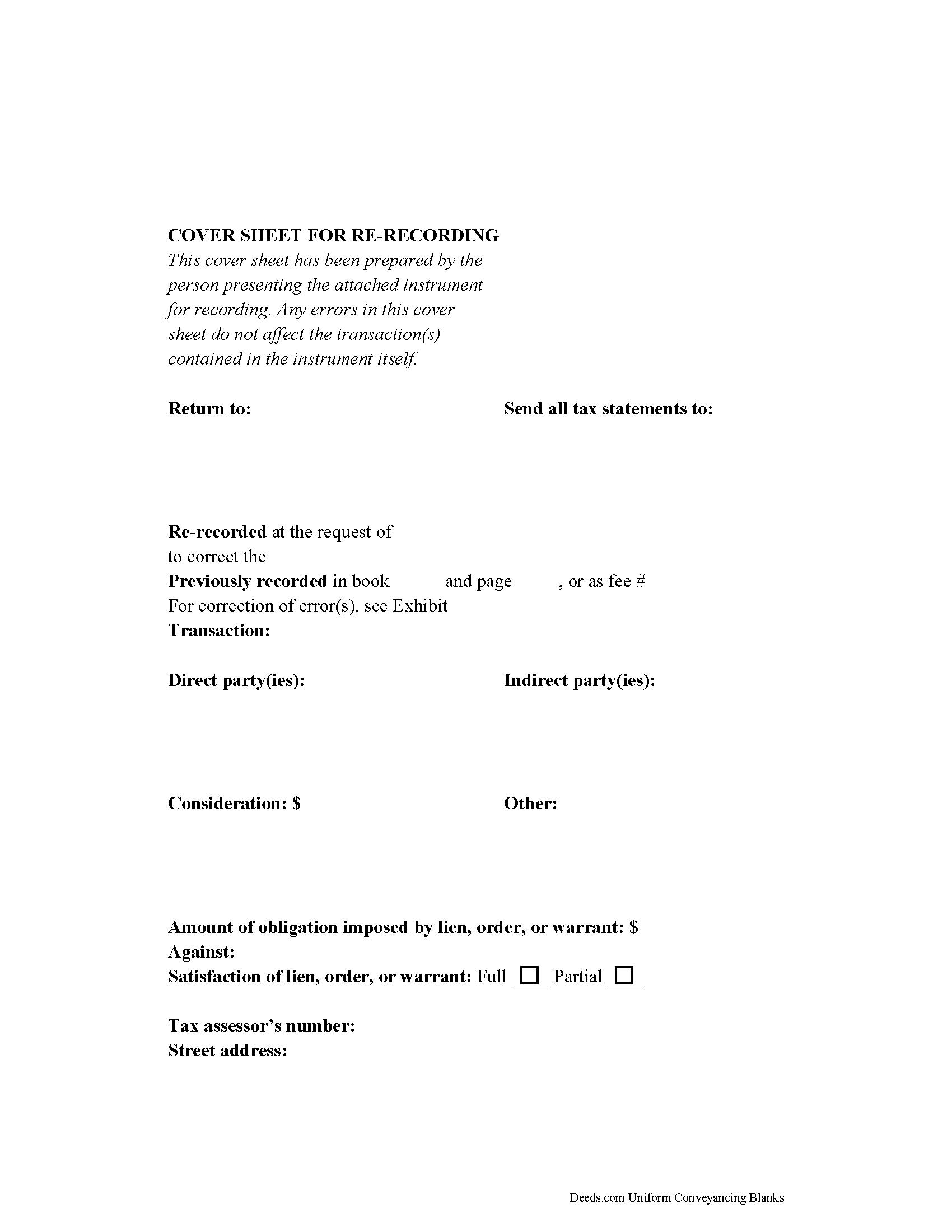
Correcting Recorded Documents in Oregon with a Re-recording Certificate
If an instrument is recorded and later found to have missing, incomplete, or incorrect information, Oregon law requires that a statutory statement referencing the prior deed -- called a re-recording certificate -- appear either on the first page of the original document or on an attached cover sheet of a re-recorded instrument (ORS 205.244). The re-recording certificate must identify the person requesting the re-recording, the specific error corrected by the re-recording, and the location where the original deed was recorded (ORS 205.244(2)).
If the re-recording certificate appears on a newly generated cover sheet, the cover sheet must meet first-page requirements under ORS 205.234(2), which include the return address, name of transaction, grantor and grantee information, the true and actual consideration for the transfer, and, if applicable, the lien amount and satisfaction.
When re-recording a certified copy of a previously recorded instrument, no alterations may be made to correct the document (ORS 205.244(3)). Instead, make the necessary correction on an attachment and include it, along with the un... More Information about the Oregon Correction Deed
Easement Deed
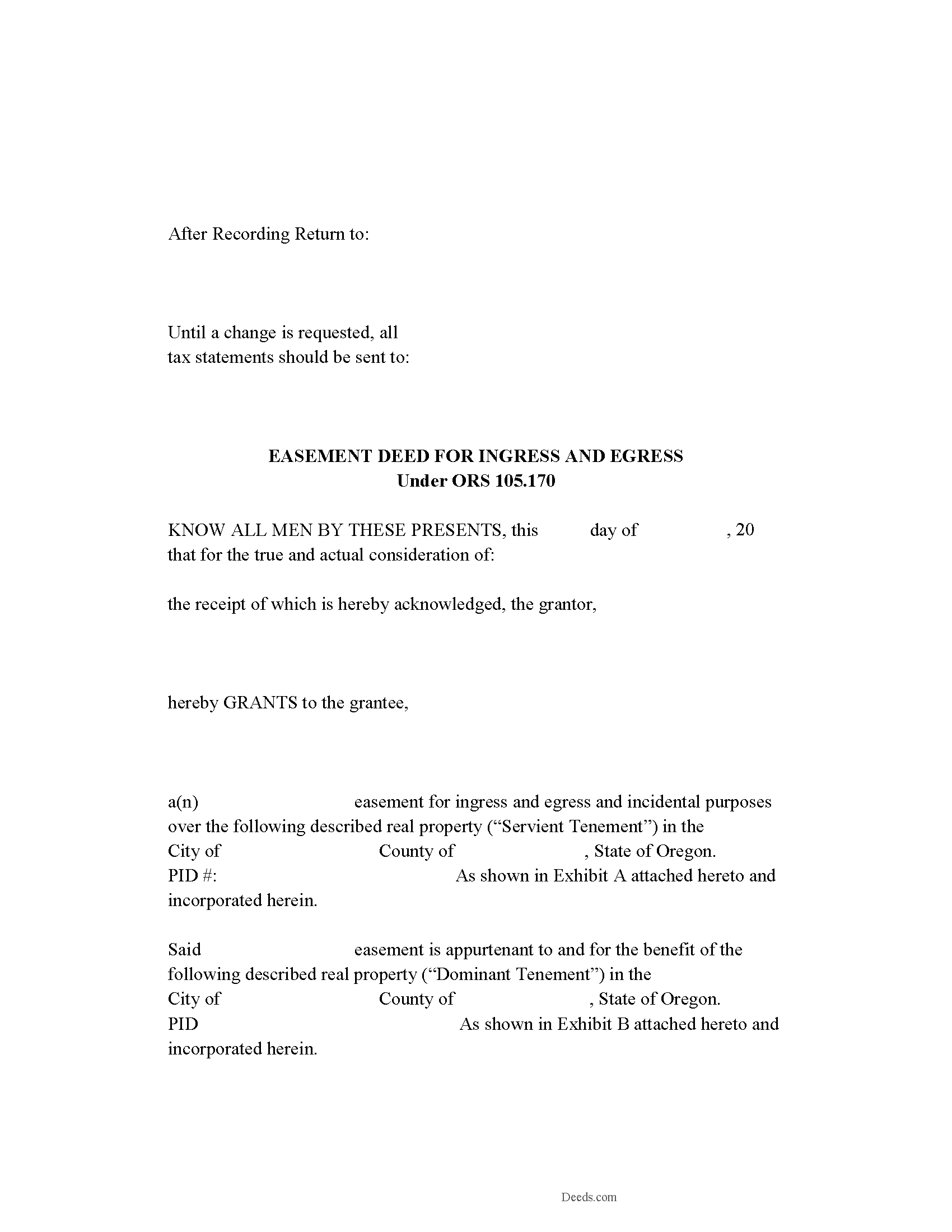
An easement is defined by Oregon statute as a non-possessory interest in the land of another person that entitles the holders of an interest in the easement to a private right of way, embodying the right to pass across another's land (105.170). The holders of an interest in any easement are required to maintain the easement in repair (105.175). Certain types of easements, such as solar energy easements and wind energy easements have specific recording guidelines, which are given in sections 105.895 and 105.910 of the Oregon Revised Statutes.
An instrument creating an easement that is executed by the person from whom the interest is intended to pass, and acknowledged or proved in the manner provided for the acknowledgment of conveyances, may be indexed and recorded in the records of deeds of real property in the county where the property is located (93.710). An easement deed can be acknowledged before any judge of the Supreme Court, circuit judge, county judge, justice of the peace, or notary public within the state of Oregon. A seal of the grantor, corporate or otherwise, is not required (93.410). A county clerk may refuse to record an easement deed if it does not contain the o... More Information about the Oregon Easement Deed
Termination of Easement
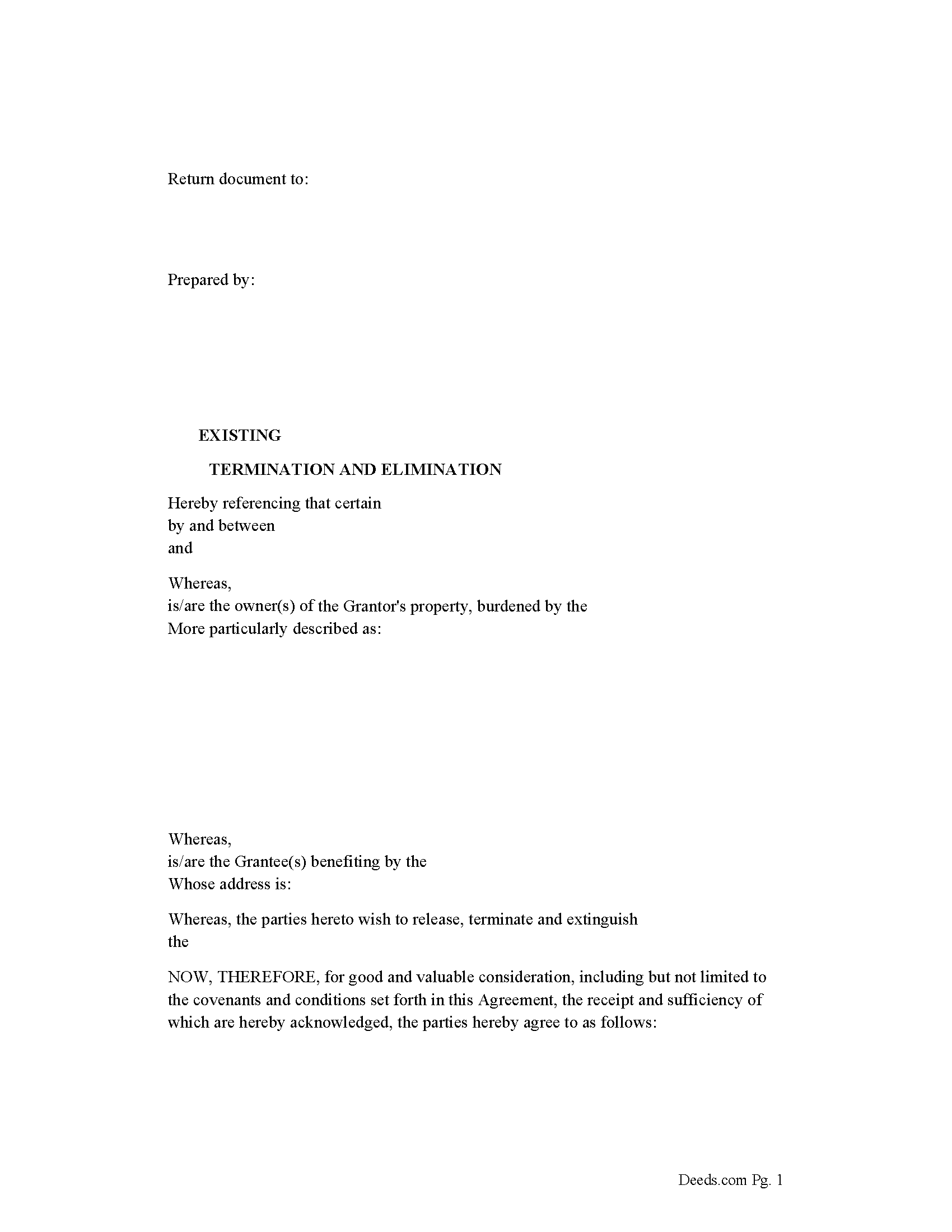
Use this form to release, terminate, extinguish a previously recorded document that involves access to and from a property.
Documents such as:
1. Easement Deeds or Agreements (An easement is a non-possessory interest in land, granting the right to use someone else's property for a specific purpose, like a driveway or utility line)
2. Access Roads
3. Right of Ways
4. Utility Easements (Power, Gas, Water, Sewer, Etc.)
5. Drainage Easements
This document allows the owner of the land, burdened by the access and the party that benefits from the access, to sign an agreement releasing the property from such access, ... More Information about the Oregon Termination of Easement
Mineral Deed
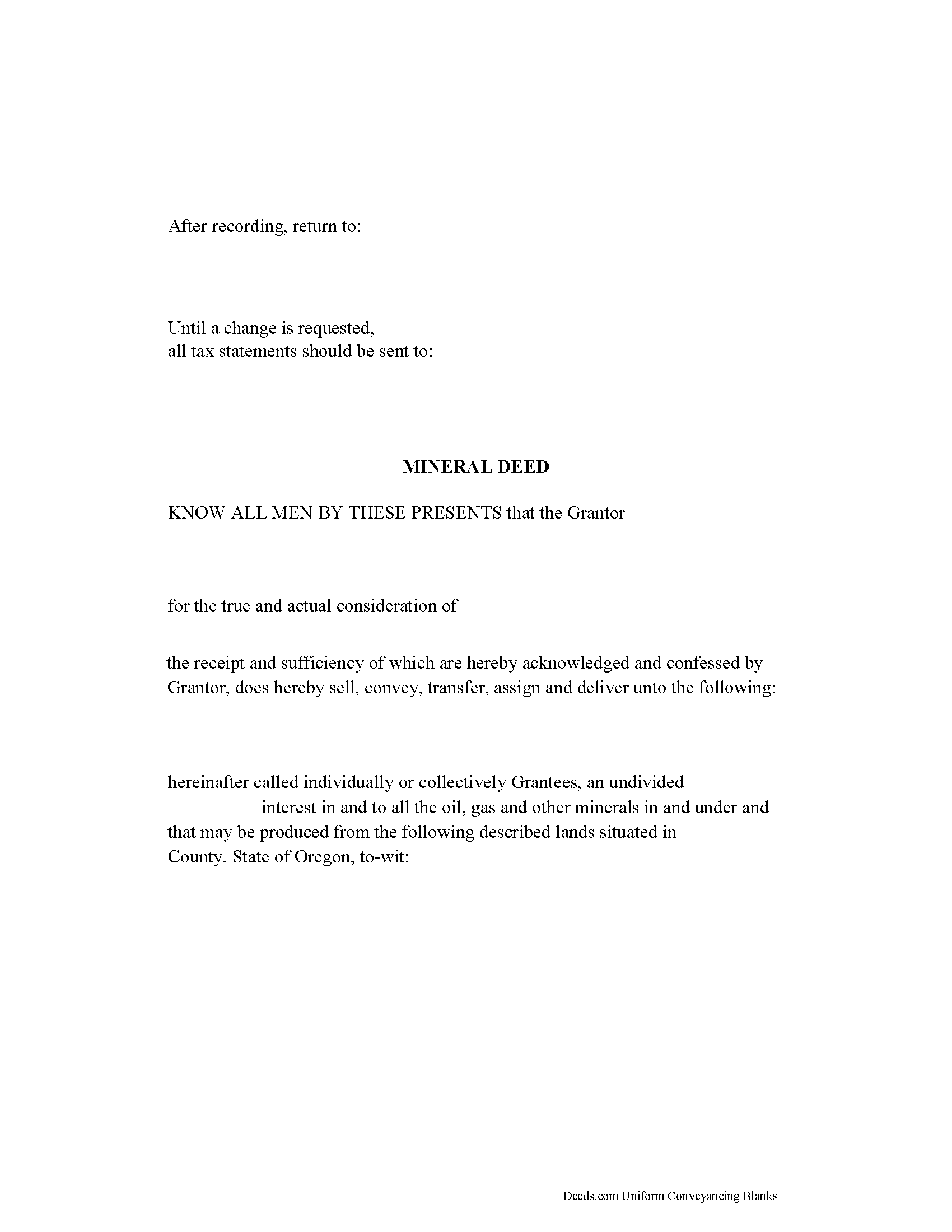
The General Mineral Deed in Oregon transfers oil, gas, and mineral rights from the grantor to the grantee. THIS IS NOT A LEASE. There are no Exceptions or Reservations included.
The transfer includes the oil, gas and other minerals of every kind and nature. It also transfers any and all rights to receive royalties, overriding royalties, net profits interests or other payments out of or with respect to those oil, gas and other minerals. The Grantor can stipulate the percentage of Mineral Rights the Grantee will receive and is made subject to any rights existing under any valid and subsisting oil and gas lease or leases of record.
This general mineral deed gives the grantee the right to access, for the purpose of mining, drilling, exploring, operating and developing said lands for oil, gas, and other minerals, and storing handling, transporting and marketing of such.
In this document the Grantor Warrants and will defend said Title to Grantee. Use of this document has a permanent effect on your rights to the property, if you are not completely sure of what you are executing seek the advice of a legal professional.
(Oregon MD Package includes form, guidelines, and completed... More Information about the Oregon Mineral Deed
Mineral Deed with Quitclaim Covenants
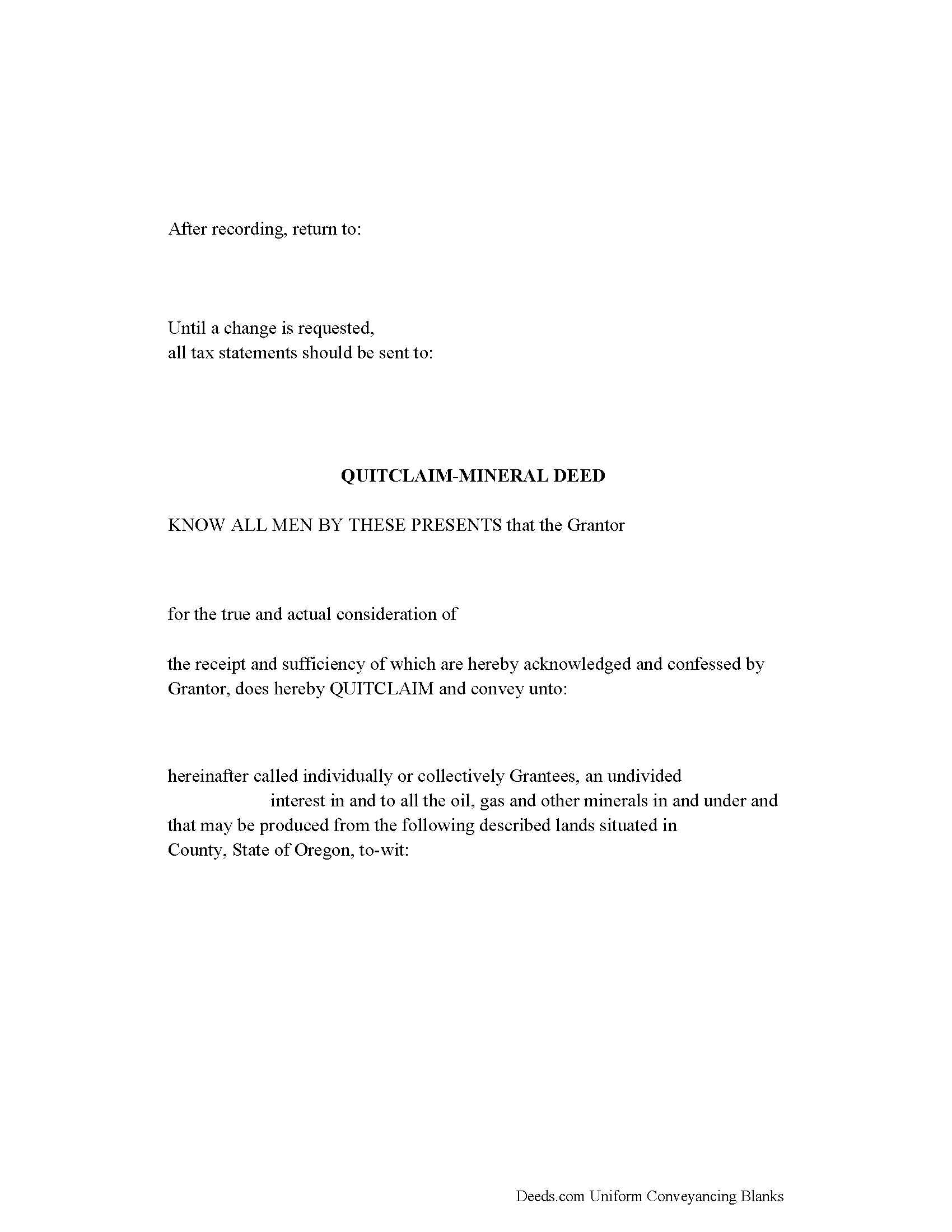
The General Mineral Deed in Oregon Quitclaims oil, gas, and mineral rights from the grantor to the grantee. THIS IS NOT A LEASE. There are no Exceptions or Reservations included.
The transfer includes the oil, gas and other minerals of every kind and nature. The Grantor can stipulate the percentage of Mineral Rights the Grantee will receive.
This general mineral deed gives the grantee the right to access, for the purpose of mining, drilling, exploring, operating and developing said lands for oil, gas, and other minerals, and storing handling, transporting and marketing of such.
The seller, or grantor Quitclaims the mineral rights and does NOT accept responsibility to any discrepancy of title (This assignment is without warranty of title, either express or implied)
Uses: Mineral deeds with quitclaim are often used in situations where the grantor wants to quickly release any interest they might have in mineral rights, such as in settling estates, resolving disputes, clearing up uncertainties about ownership in a title's history or when mineral rights have previously been severed or fragmented from surface rights and cloud a title, making it difficult to transfer property.... More Information about the Oregon Mineral Deed with Quitclaim Covenants
Trust Deed and Promissory Note
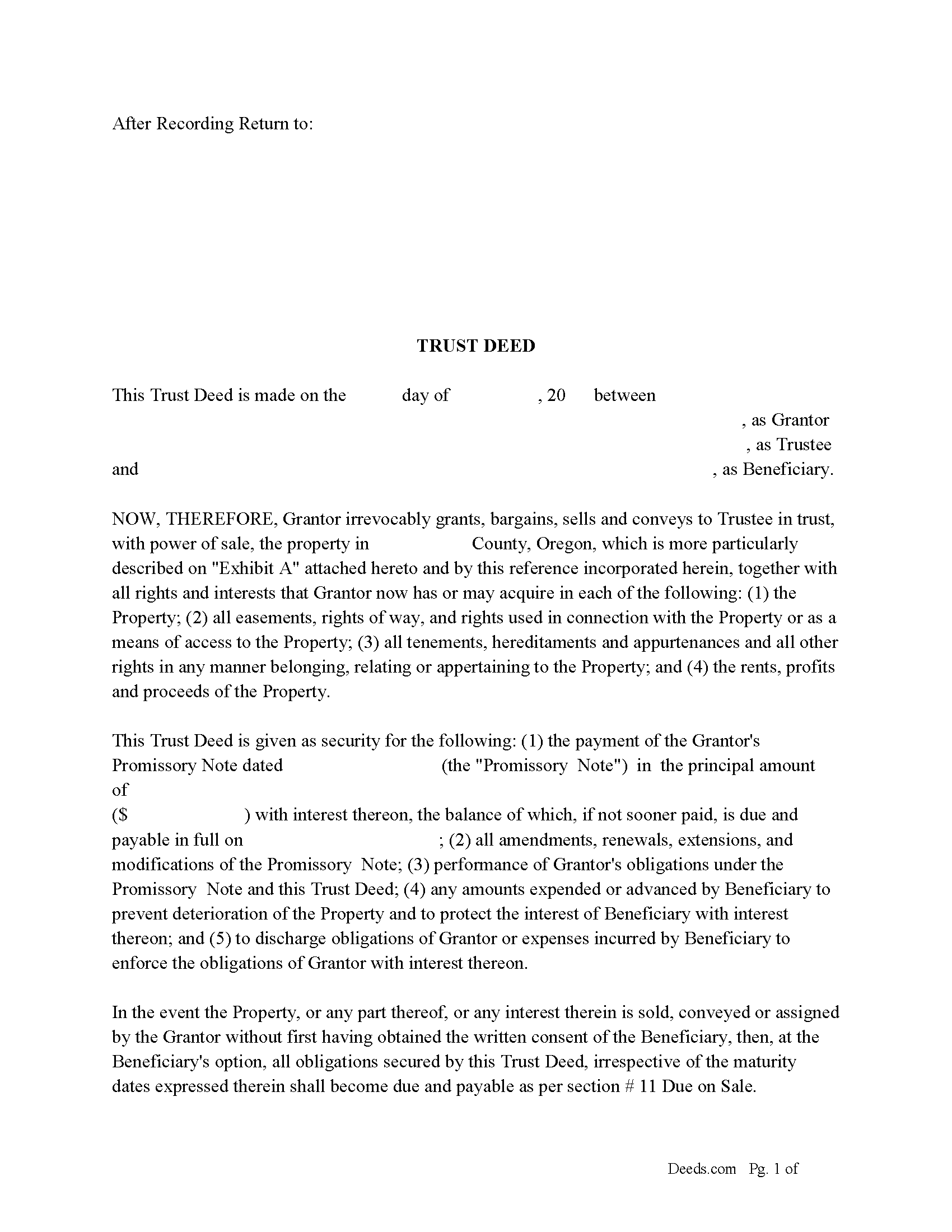
There are three parties in a Trust Deed in which the Grantor/Borrower (conveys an interest in real property to a trustee in trust to secure the performance of an obligation the grantor or other person named in the deed owes to a beneficiary.) (ORS 86.705(8))
("Grantor" means the person that conveys an interest in real property by a trust deed as security for the performance of an obligation.) ( ORS 86.705(4))
("Beneficiary")/ Lender (means a person named or otherwise designated in a trust deed as the person for whose benefit a trust deed is given, or the person's successor in interest, and who is not the trustee unless the beneficiary is qualified to be a trustee under ORS 86.713) ( ORS 86.705(2))
("Trustee" means a person, other than the beneficiary, to whom a trust deed conveys an interest in real property, or the person's successor in interest, or an employee of the beneficiary, if the employee is qualified to be a trustee under ORS 86.713) ( ORS 86.705(9)) The guidelines provided explain how to easily choose a trustee.
Trust Deeds are considered advantageous for lenders, foreclosure is done non-judicially (saving time and expense), the process is called "Foreclosure by ... More Information about the Oregon Trust Deed and Promissory Note
Deed of Full Reconveyance
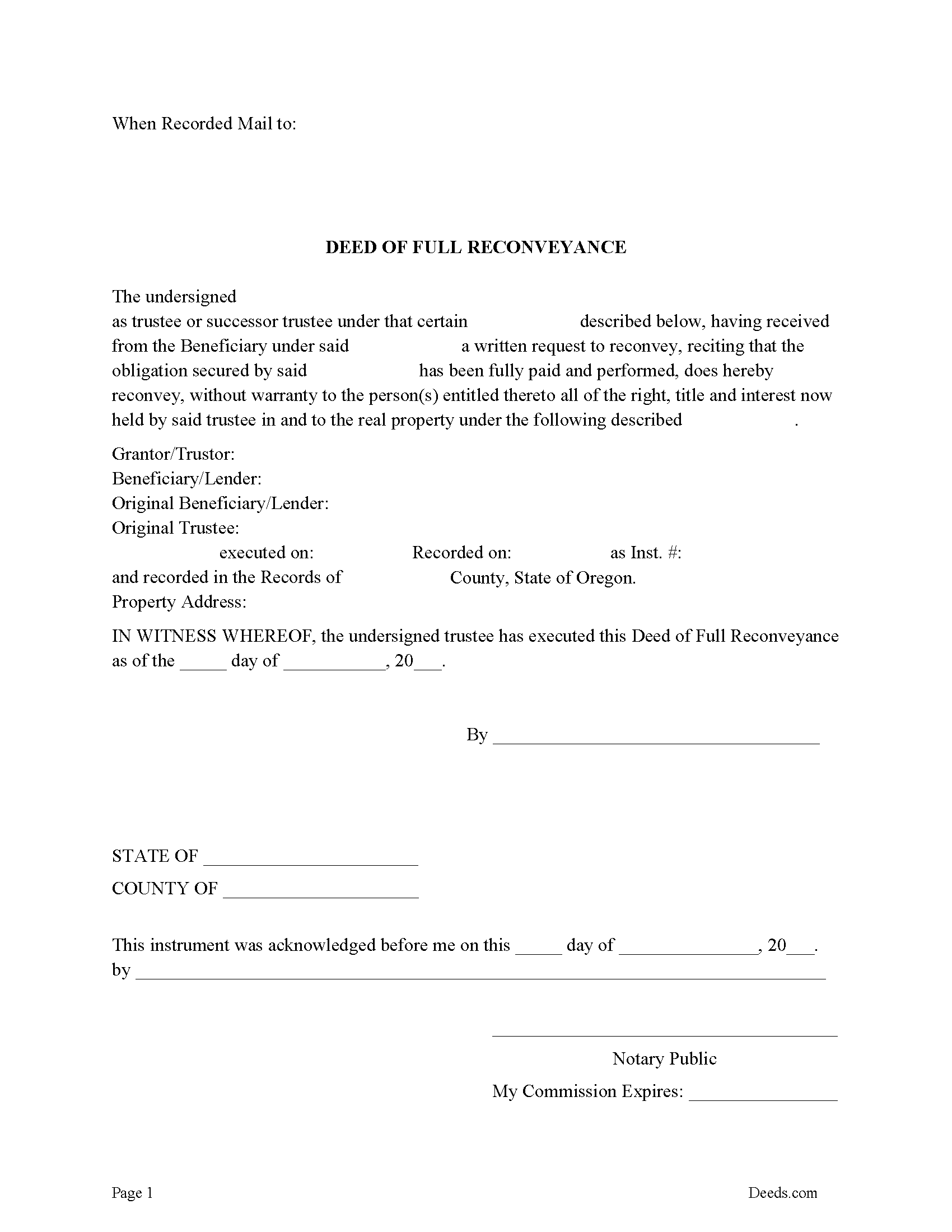
This form is used by the current trustee upon receiving a written request from the beneficiary/lender to reconvey property when a Deed of Trust of Trust Deed has been fully paid.
((1) Within 30 days after performance of the obligation secured by the trust deed, the beneficiary shall deliver a written request to the trustee to reconvey the estate of real property described in the trust deed to the grantor. Within 30 days after the beneficiary delivers the written request to reconvey to the trustee, the trustee shall reconvey the estate of real property described in the trust deed to the grantor. In the event the obligation is performed and the beneficiary refuses to request reconveyance or the trustee refuses to reconvey the property, the beneficiary or trustee so refusing shall be liable as provided by ORS 86.140 (Liability of mortgagee for failure to discharge mortgage) in the case of refusal to execute a discharge or satisfaction of a mortgage on real property. The trustee may charge a reasonable fee for all services involved in the preparation, execution and recordation of any reconveyance executed pursuant to this section.)
(ORS 86.720 Reconveyance upon performance)
(Or... More Information about the Oregon Deed of Full Reconveyance
Substitution of Trustee and Deed of Reconveyance (For Deed of Trust / Trust Deed)
.png)
In this form the beneficiary/lender changes the trustee (independent third party) then the new trustee reconveys the Deed of Trust or Trust Deed.
((1) Within 30 days after performance of the obligation secured by the trust deed, the beneficiary shall deliver a written request to the trustee to reconvey the estate of real property described in the trust deed to the grantor. Within 30 days after the beneficiary delivers the written request to reconvey to the trustee, the trustee shall reconvey the estate of real property described in the trust deed to the grantor. In the event the obligation is performed and the beneficiary refuses to request reconveyance or the trustee refuses to reconvey the property, the beneficiary or trustee so refusing shall be liable as provided by ORS 86.140 (Liability of mortgagee for failure to discharge mortgage) in the case of refusal to execute a discharge or satisfaction of a mortgage on real property. The trustee may charge a reasonable fee for all services involved in the preparation, execution and recordation of any reconveyance executed pursuant to this section.)
(ORS 86.720 Reconveyance upon performance)
Who can be a Trustee? Under ORS 86.71... More Information about the Oregon Substitution of Trustee and Deed of Reconveyance (For Deed of Trust / Trust Deed)
Assignment of Trust Deed by Beneficiary or Successor in Interest
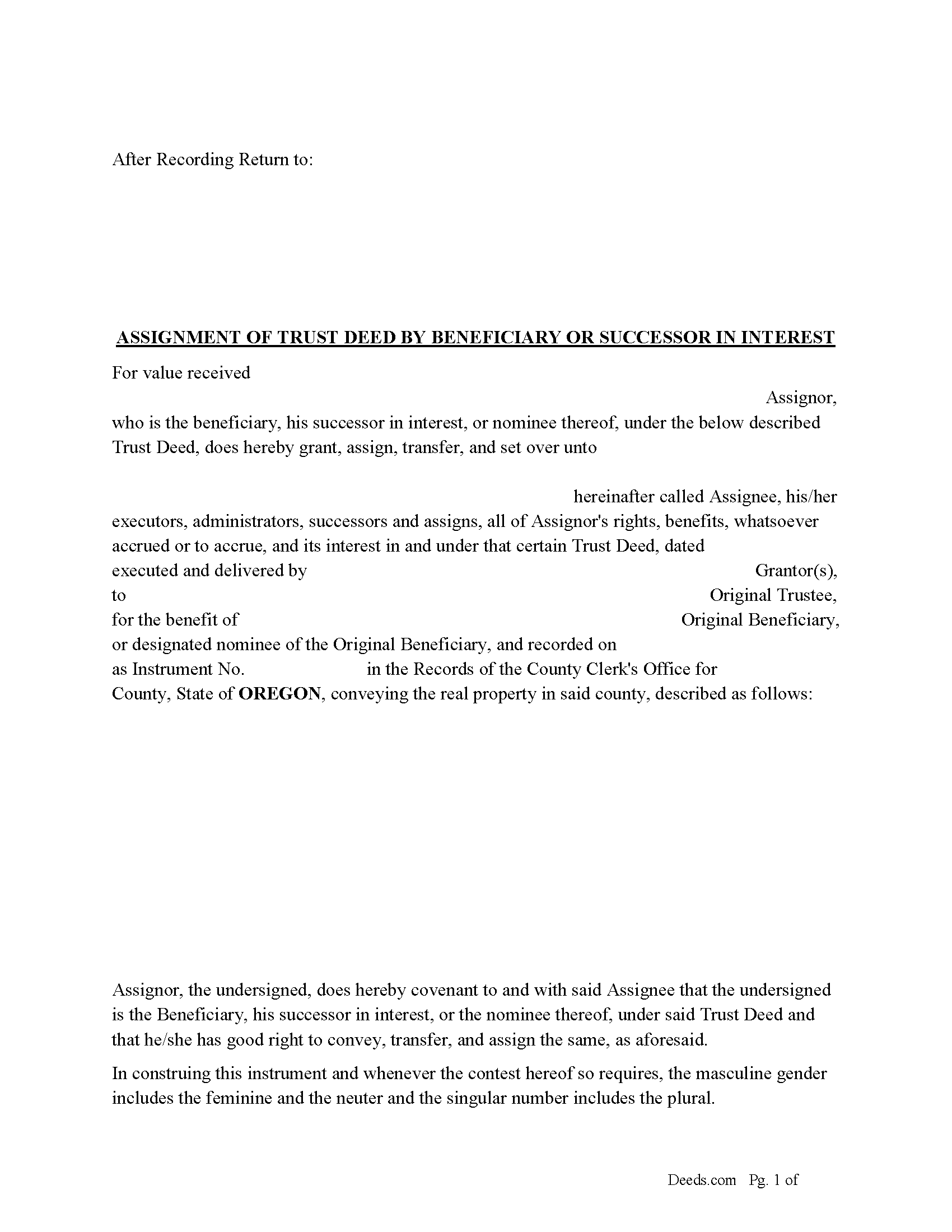
In this form the assignment/transfer of a Trust Deed/Deed of Trust is made by the beneficiary/lender or successor in interest.
("Trust deed" means a deed executed in conformity with ORS 86.705 (Definitions for ORS 86.705 to 86.815) to 86.815 (Time within which foreclosure must be commenced) that conveys an interest in real property to a trustee in trust to secure the performance of an obligation the grantor or other person named in the deed owes to a beneficiary.) (ORS 86.705(8))
("Beneficiary" means a person named or otherwise designated in a trust deed as the person for whose benefit a trust deed is given, or the person's successor in interest, and who is not the trustee unless the beneficiary is qualified to be a trustee under ORS 86.713 (Qualifications of trustee) (1)(b)(D).) (ORS 86.705(2))
ORS 86.060 Assignment of mortgage Mortgages may be assigned by an instrument in writing, executed and acknowledged with the same formality as required ... More Information about the Oregon Assignment of Trust Deed by Beneficiary or Successor in Interest
Durable Power of Attorney
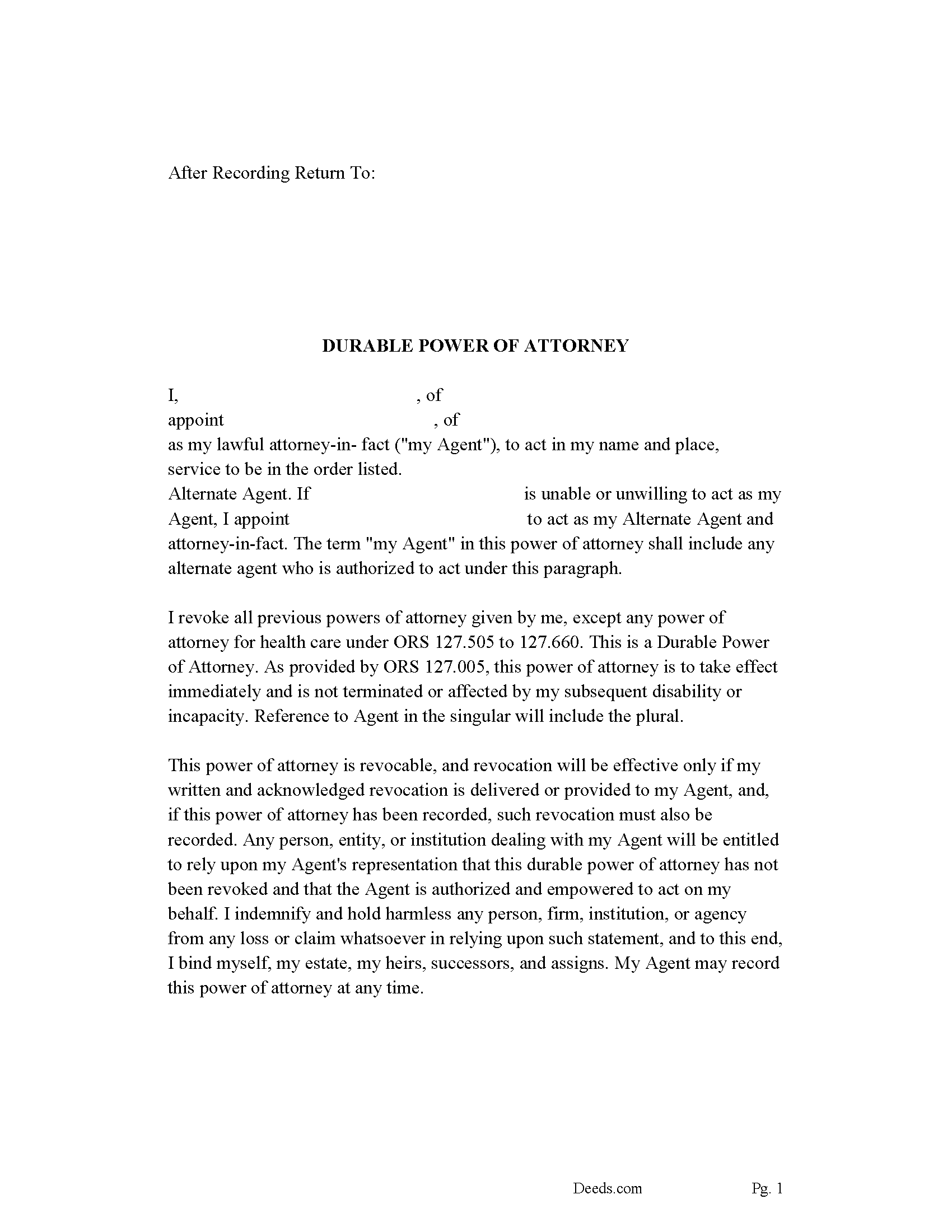
This power of attorney revokes all previous powers of attorney given, except any power of attorney for health care under ORS 127.505 to 127.660. This is a Durable Power of Attorney as provided by ORS 127.005, this power of attorney is to take effect immediately and is not terminated or affected by the principal's subsequent disability or incapacity.
Governing Law. The validity and construction of this power of attorney shall be determined under Oregon law.
This power of attorney offers broad and sweeping powers and is fully formatted for recording if you so wish to do so.
(Oregon DPOA Package includes form, guidelines, and completed example)
... More Information about the Oregon Durable Power of Attorney
Special Power of Attorney for the Purchase of Property
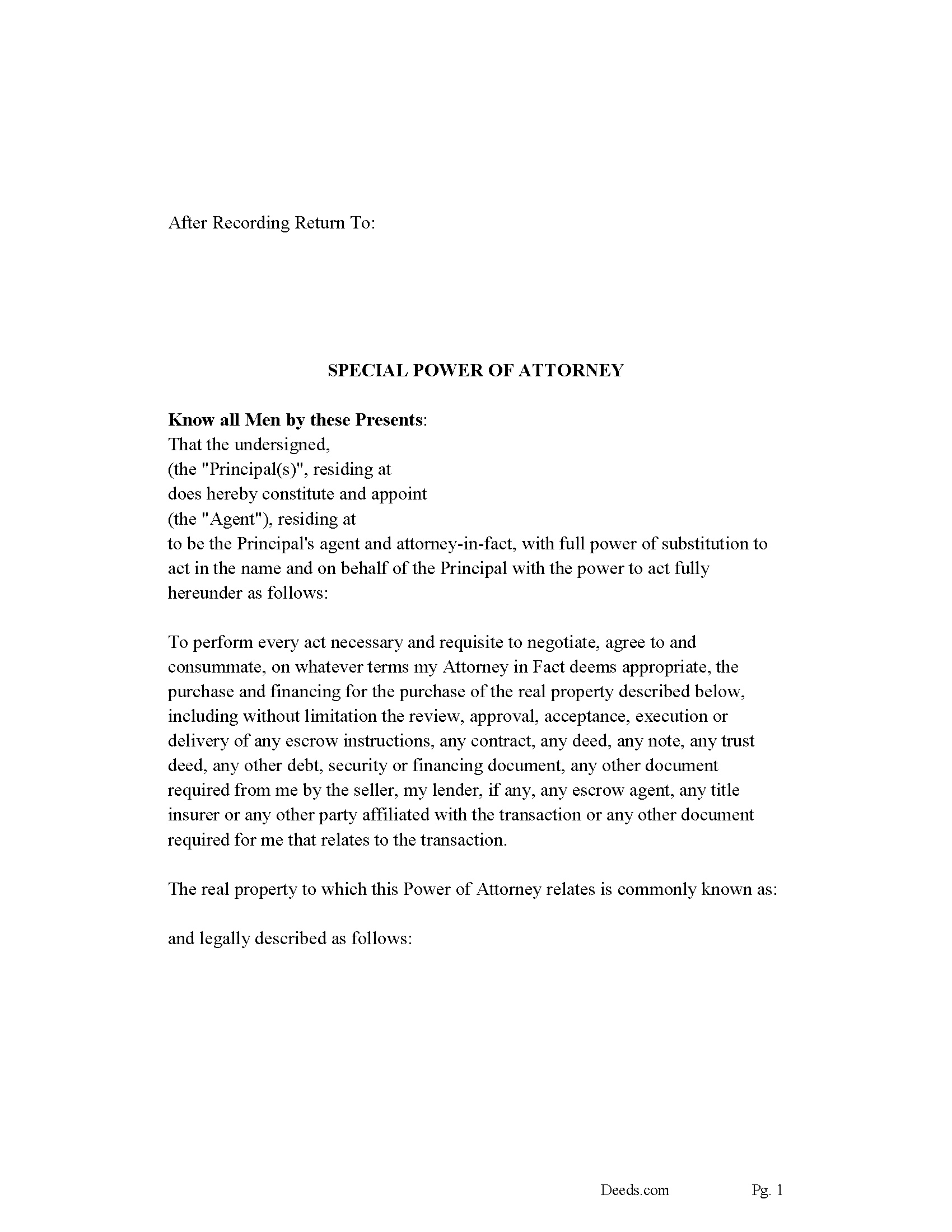
This is a Special Power of Attorney in which the first party, Principal authorizes a second Party, Attorney-in-fact, to purchase a certain property on your behalf. In this power of attorney, you are empowering your agent to perform every act necessary and requisite to negotiate, agree to and consummate, on whatever terms your Attorney in Fact deems appropriate, the purchase and financing for the purchase of the real property described within. This Power of Attorney (i) shall not be affected by the disability of the principal (ii) shall be governed, as to its validity, terms and enforcement, by those laws of the State of Oregon that apply to instruments negotiated, executed, delivered and performed solely within the State of Oregon. Further powers can be defined or limited in the "Special Instructions" area of the form.
When would you need a Special Power of Attorney for the purchase of real property? For example, a person might use this form to purchase a property in the State of Oregon by delegating authority to another person to handle the transaction locally.
(Oregon SPOA-Purchase Package includes form, guidelines, and completed example)... More Information about the Oregon Special Power of Attorney for the Purchase of Property
Special Power of Attorney for the Sale of Property
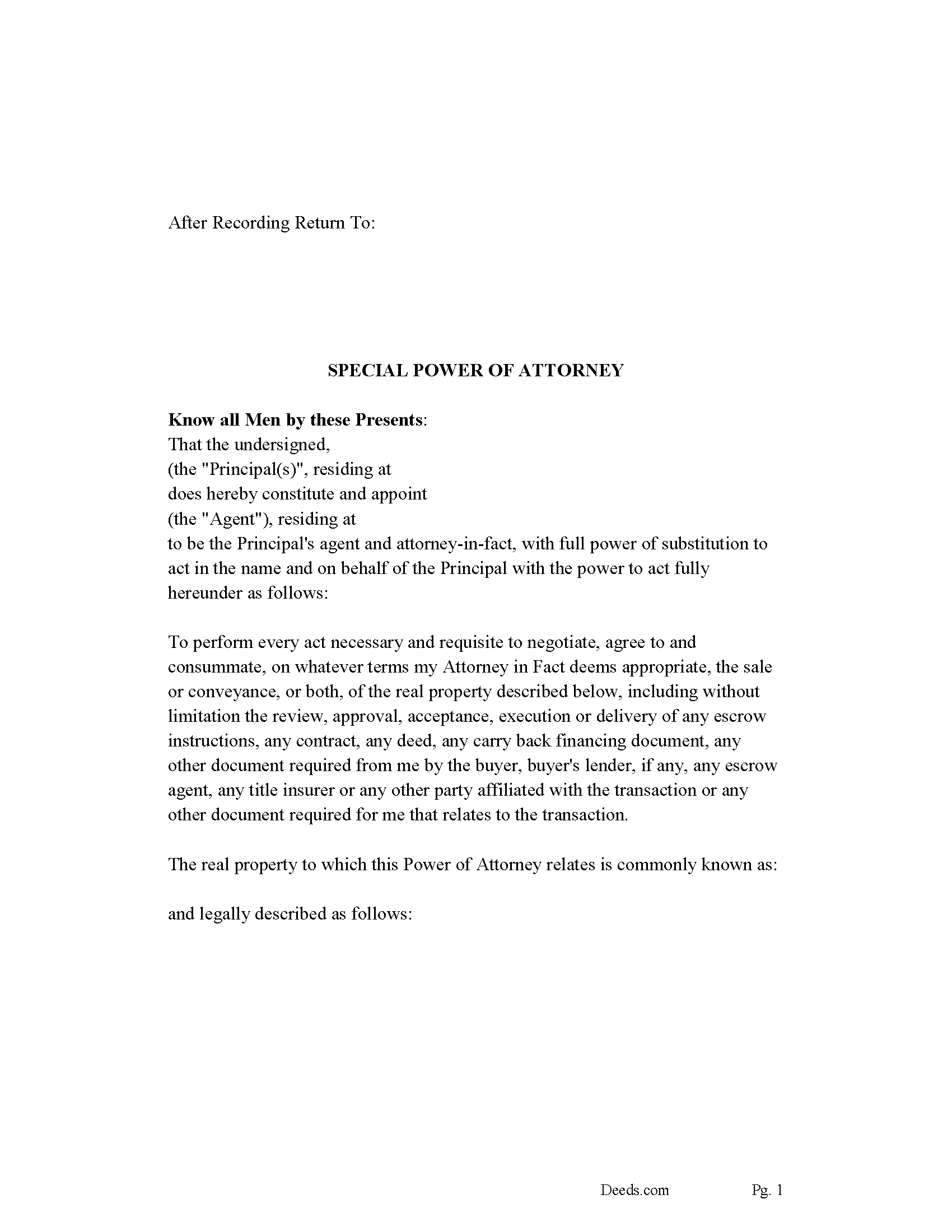
This is a Special Power of Attorney in which the first party, Principal authorizes a second Party, Attorney-in-fact, to Sell a certain property on your behalf. In this power of attorney, you are empowering your agent to perform every act necessary and requisite to negotiate, agree to and consummate, on whatever terms your Attorney in Fact deems appropriate, the sale or conveyance, or both, of the real property described. This Power of Attorney (i) shall not be affected by the disability of the principal (ii) shall be governed, as to its validity, terms and enforcement, by those laws of the State of Oregon that apply to instruments negotiated, executed, delivered and performed solely within the State of Oregon, and (iii) may be executed in any number of counterparts, each of which shall have the same effect as if it were the original instrument and all of which shall constitute one and the same instrument. Further powers can be defined or limited in the "Special Instructions" area of the form. When would you need a Special Power of Attorney for the sale of real property? For example, a person might use this form to sell a second home in State of Oregon by delegating authority to ano... More Information about the Oregon Special Power of Attorney for the Sale of Property
Notice of Pendency / Lis Pendens
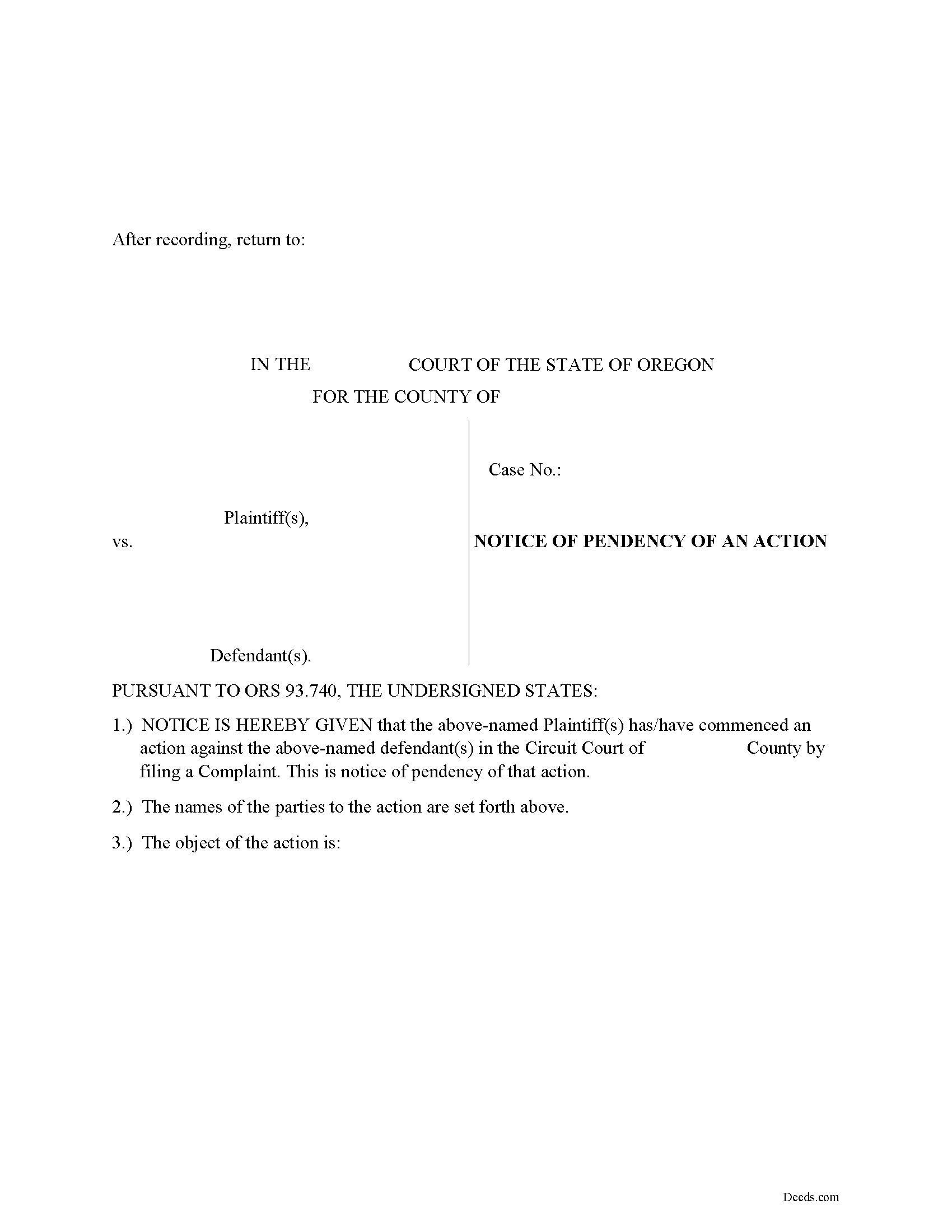
When filing a case affecting title to real property or at any time after, as long as the case is pending, any party to the suit may file a Pendency of Action. To be effective it must be recorded at the Recorder of Deeds/ Clerks Office in every county where said property is located. (The notice shall be recorded in the same book and in the same manner in which mortgages are recorded.) From the time of recording, the Notice of Pendency, becomes constructive notice to would be purchasers or encumbrancers. Such Notice will contain (the names of the parties, the object of the suit, and the description of the real property in the county involved, affected, or brought in question, signed by the party or the attorney of the party.) (ORS 93.740)
(Oregon Notice of LP Package includes form, guidelines, and completed example)... More Information about the Oregon Notice of Pendency / Lis Pendens
Release of / Pendency of an Action / Lis Pendens
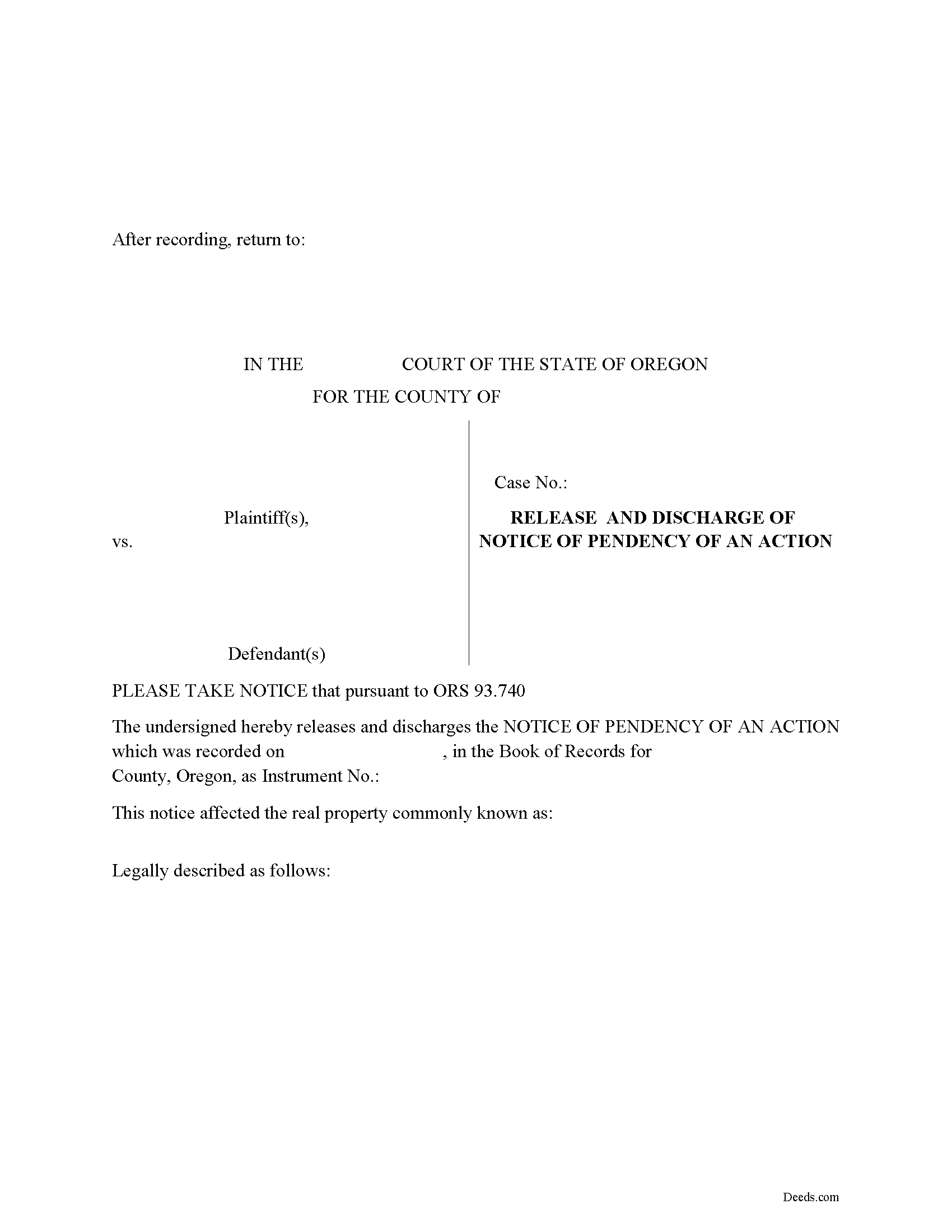
A Cancellation/Release of Notice of Pendency can be filed by a party to the suit or by the attorney signing the notice. This form has adequate space to add multiple parties, which is common in a claim involving real property.
(Oregon Release of Notice of Pendency Package includes form, guidelines, and completed example)... More Information about the Oregon Release of / Pendency of an Action / Lis Pendens
Transfer on Death Deed
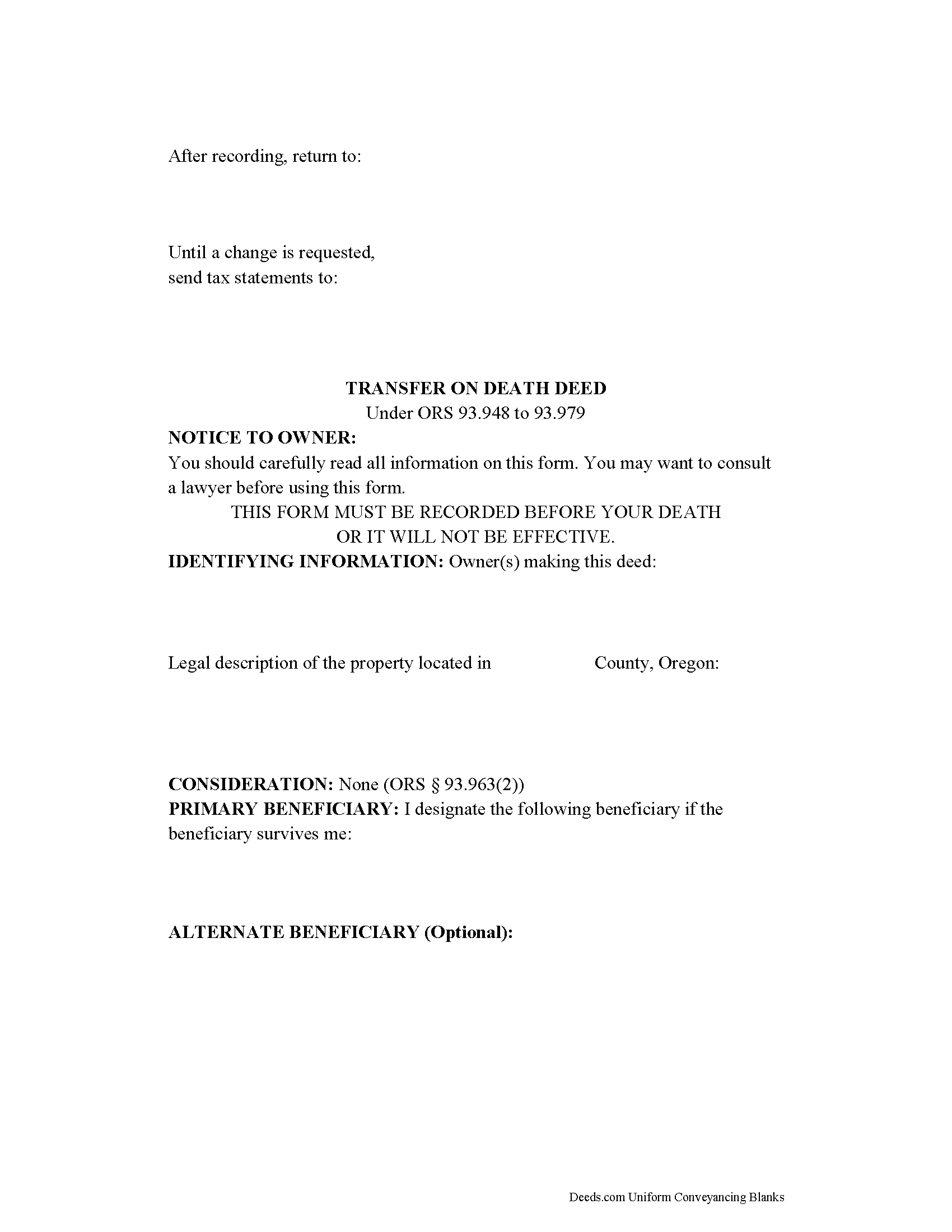
Transfer on death deeds are nontestamentary ( 93.957). This means the property conveyed at death does not become part of the estate, and passes to the beneficiary without the need for probate distribution. Because TODDs deal with disposing assets after death, however, the transferor must meet the same standards for mental capacity as needed to execute a will ( 93.959).
The TODD itself must meet the requirements set forth for a "properly recordable inter vivos deed," except that it must "state that the transfer to the designated beneficiary is to occur at the transferor's death" as well as identifying the primary and alternate beneficiaries by name. Also, it must be recorded, DURING THE OWNER'S LIFE, in the county where the property is located ( 93.961).
In addition to the content requirements, standard (inter vivos) deeds generally transfer a permanent present interest to the grantee (buyer). In the most basic terms, this means that once the deed is executed and recorded, the grantee owns the property. Unlike an inter vivos deed, though, TODDs do not require notice, delivery, acceptance, or consideration ( 93.963). By recording the TODD, the owner declares an intention to c... More Information about the Oregon Transfer on Death Deed
Transfer on Death Revocation
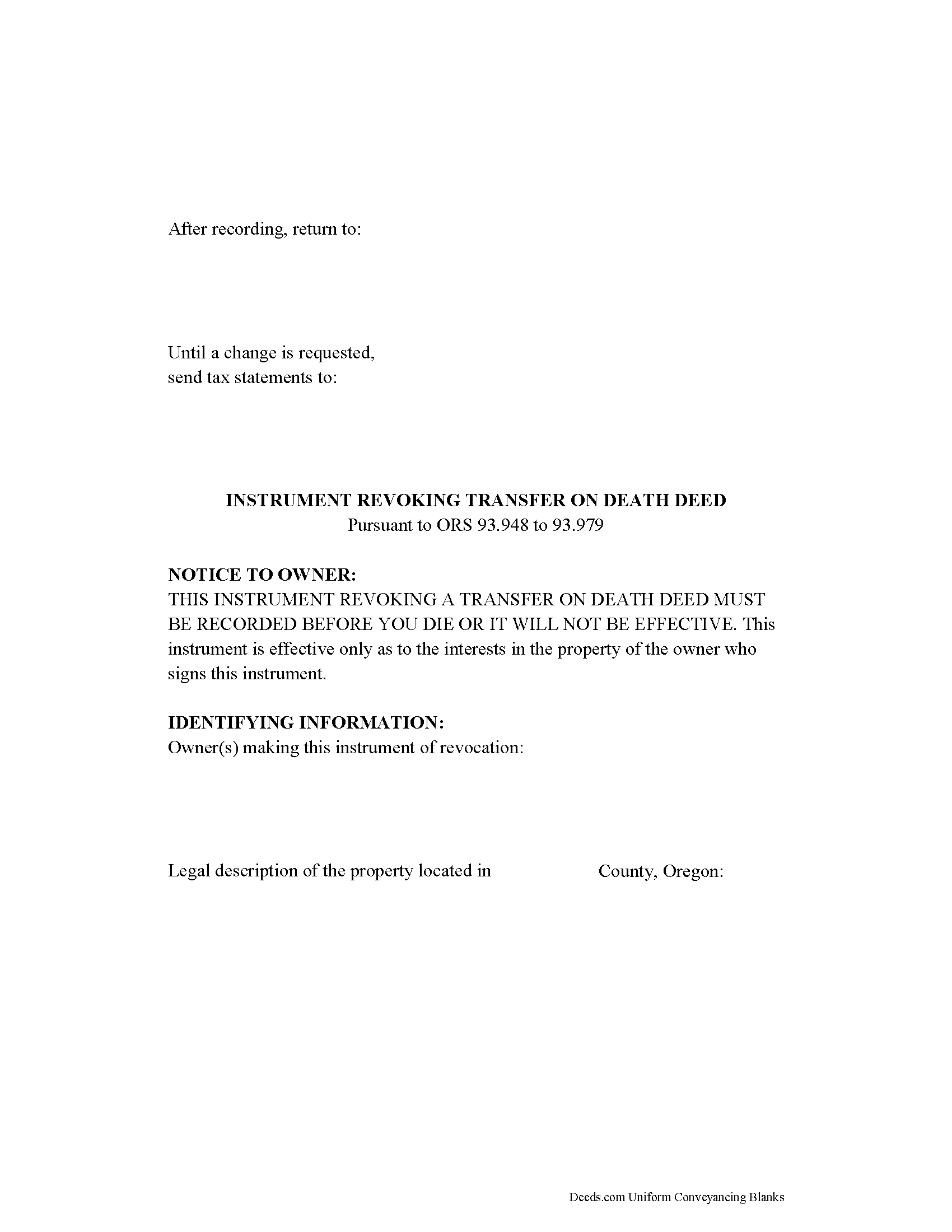
Revoking a Transfer on Death Deed in Oregon
Based on the Uniform Real Property Transfer on Death Act and located at ORS 93.948-93.979 (2011), this statute governs the use and applications of TODDs in the state of Oregon.
Estate plans are most effective when they're kept up to date. Flexible tools like transfer on death deeds help real estate owners control the distribution of what is often their most significant asset. While most deeds involve permanent, immediate transfers of a present interest in real property, TODDs allow the transferor the opportunity, during life, to readjust or even revoke the potential future interest to be conveyed at death ( 93.955 ).
The statutes set forth the rules for revoking a transfer on death deed at 93.965. Just as with a TODD, the revocation MUST be recorded while the owner is still alive or it has no effect. Once recorded, any modifications must be made by instrument. There are three primary ways to change or revoke a TODD: 1) executing and recording a new TODD that changes the details of the previous deed; 2) executing and recording an inter vivos deed, such as a warranty deed or quitclaim deed, conveying the owner's interest in the p... More Information about the Oregon Transfer on Death Revocation
Transfer on Death Affidavit of Survivorship
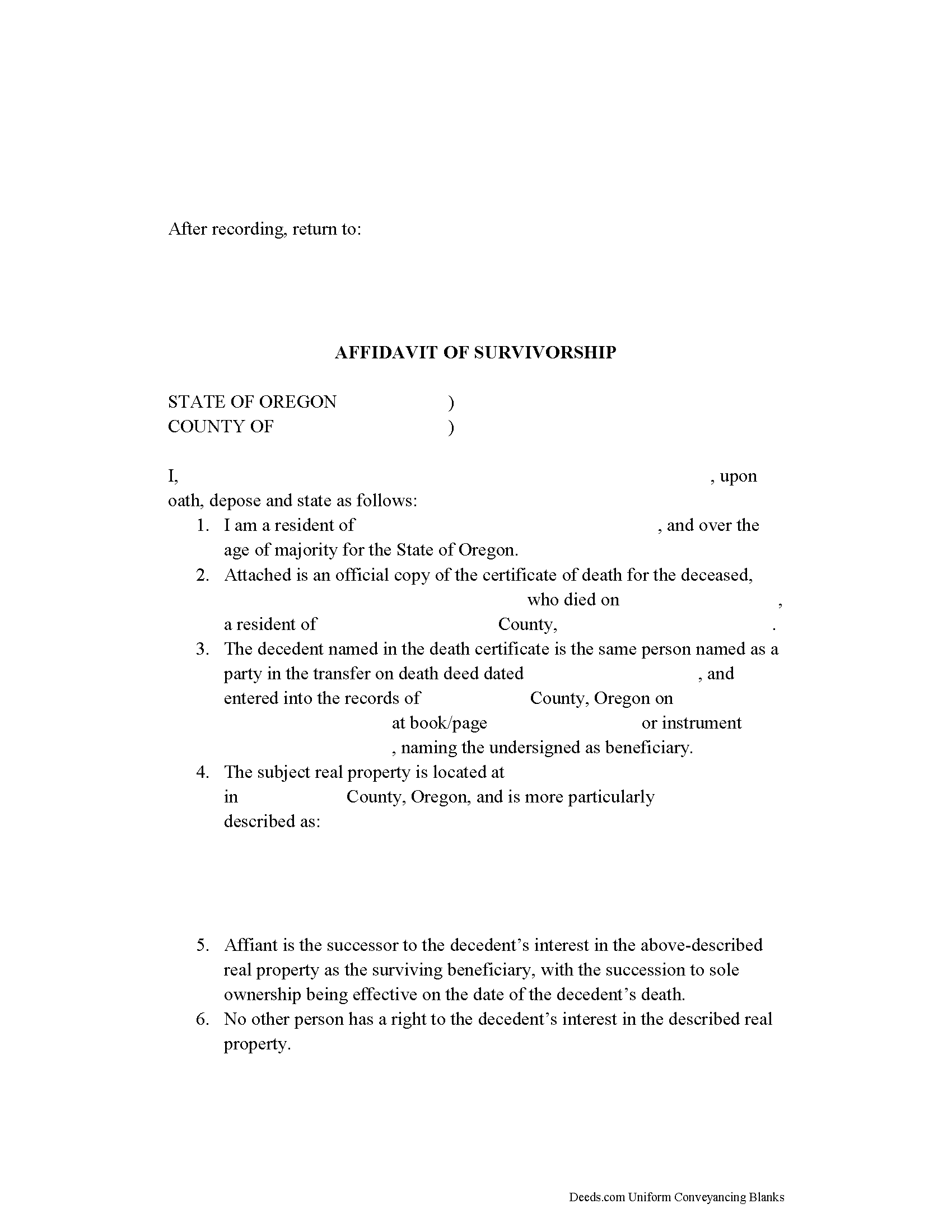
Completing the Transfer from an Oregon Transfer on Death Deed
The Uniform Real Property Transfer on Death Act was integrated into Oregon's laws at ORS 93.948-93.979 (2011). When applied correctly, owners of real property in Oregon can, while still alive, use transfer on death deeds to direct and modify what happens to their land when they die.
The statutes contain forms and specific instructions for the landowners, but provide very little information for the surviving beneficiaries. According to 93.969(1)(a)(A), when the transferor/owner dies, his/her interest in the property transfers "to the designated beneficiary in accordance with the deed if the designated beneficiary survives the transferor." There is, however, scant additional guidance for the beneficiary who wishes to officially initiate the transfer.
While there are no specific statutory steps, one way for the surviving beneficiary to formalize the conveyance is by executing and recording an affidavit of survivorship. This document, when accompanied by a certified copy of the deceased owner's death certificate, provides official notice of the change in ownership.
Land ownership comes with duties and obligat... More Information about the Oregon Transfer on Death Affidavit of Survivorship
Affidavit of Surviving Joint Tenant
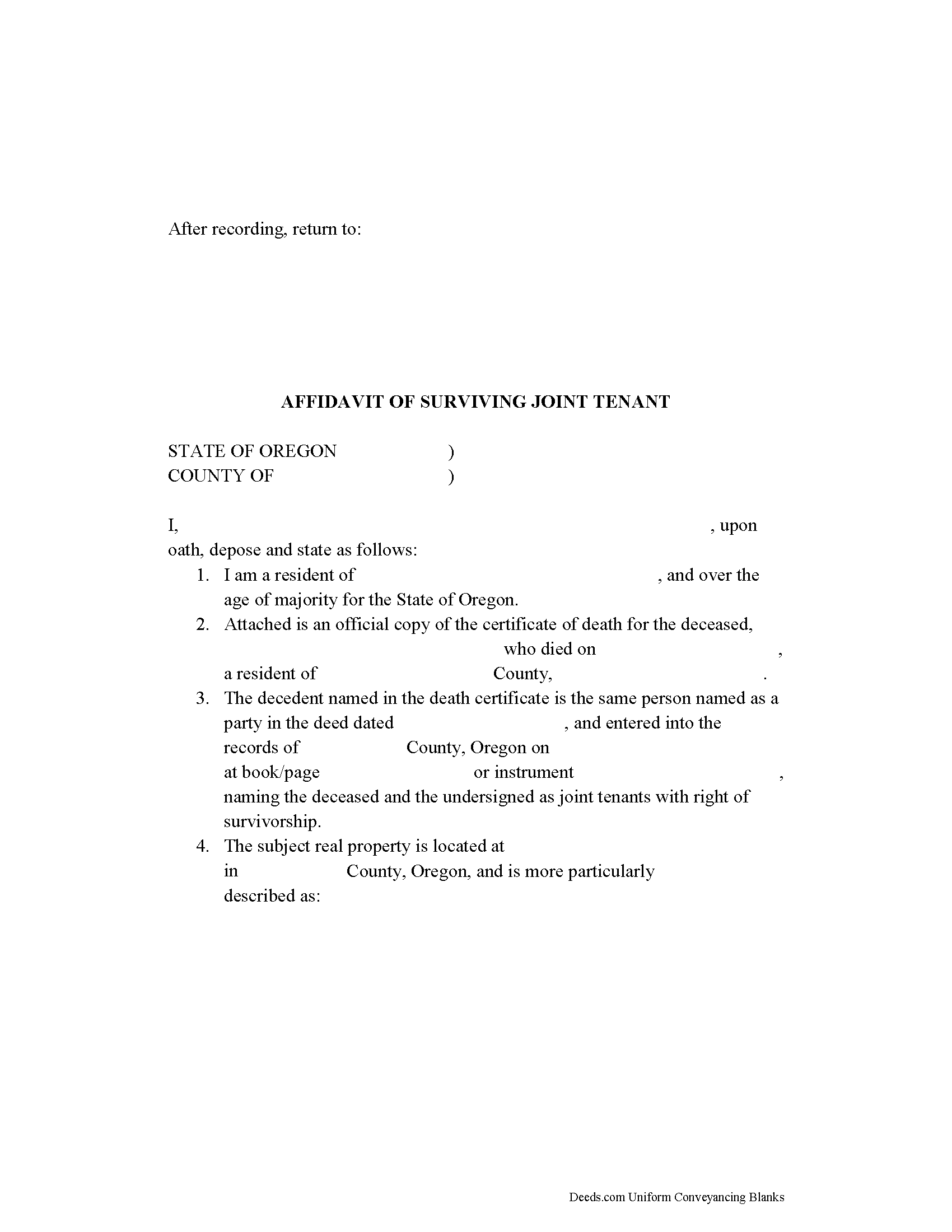
In general, when one co-owner of real property held as joint tenants with right of survivorship dies, the living co-tenant gains the property rights of the deceased owner by function of law. As long as the remaining owner survives the deceased owner by at least 120 hours, the asset is not affected by the owner's will, and therefore does not pass through the estate and is not subject to probate distribution (112.582(5)).
Even though the transfer is supposed to be automatic, the Oregon statutes contain instructions for establishing death under the survivorship rules codified at ORS 112.570 to 112.590. Primarily, to prove that the deceased owner has actually died, the living co-owner should obtain "a certified or authenticated copy of a death certificate purporting to be issued by an official or agency of the place where the death is alleged to have occurred" (112.582(2)(a)).
Once the survivor has the death certificate, he/she should submit it for recording, along with an affidavit of surviving joint tenant, to the same office that recorded the deed granting the survivorship tenancy to the co-owners. An affidavit is a document containing statements made under oath, and is admi... More Information about the Oregon Affidavit of Surviving Joint Tenant
Trustee Deed
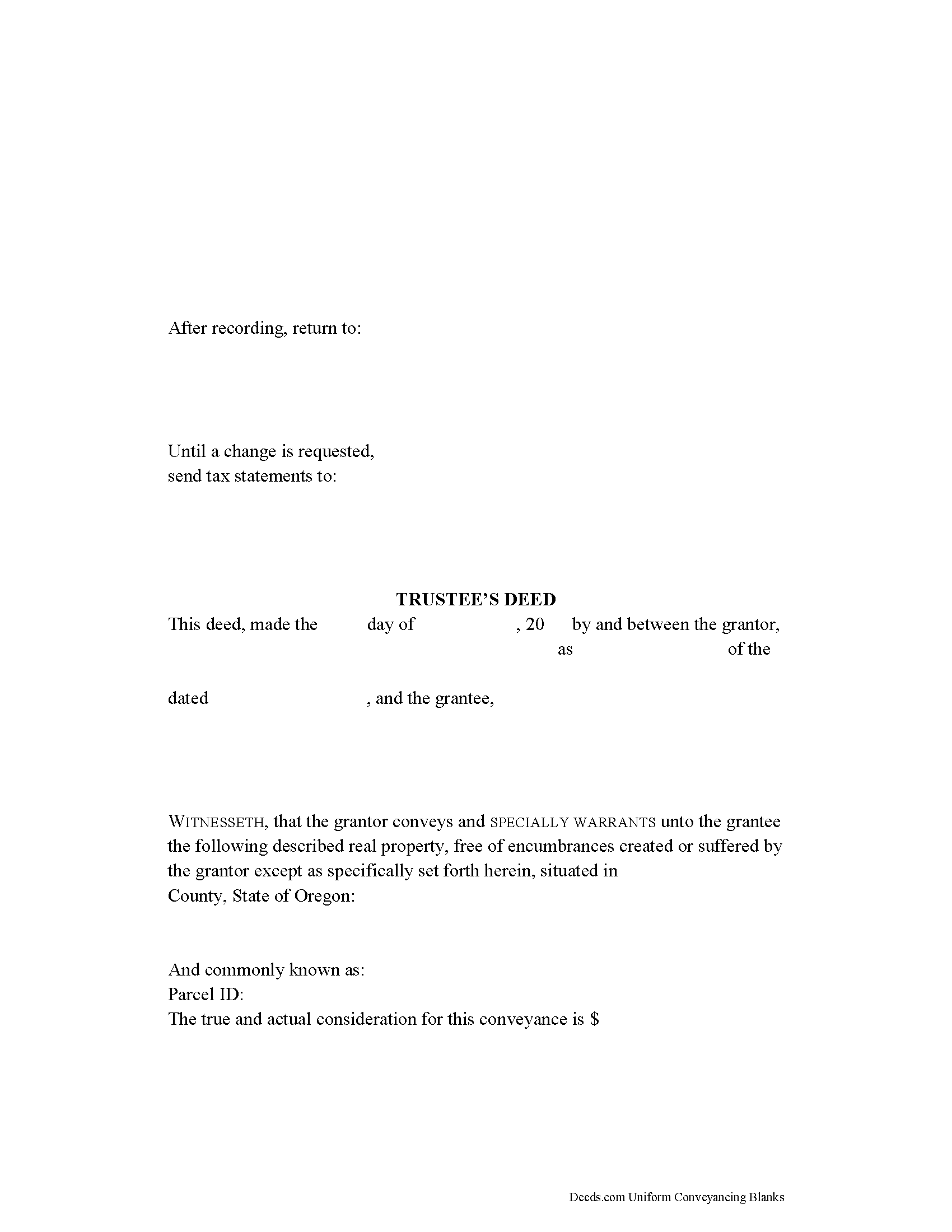
Oregon Trustee's Deeds & Transfers from Living Trusts
NOTE: This article pertains to living trusts, a type of express trust as set forth in the Oregon Uniform Trust Code (ORS 130.005). Deeds titled "trustee's deed," which transfer real property by an express trust, should not be confused with deeds titled "trustee's deed upon sale," which are used to convey real property after foreclosure under a deed of trust (see ORS 86.775 for trustee's deeds upon sale).
Oregon is among the majority of states that has adopted or introduced for adoption some form of the Uniform Trust Code, "a set of basic default rules that fairly, consistently and clearly govern voluntary trusts," providing a more consistent and uniform (as the name would suggest) framework of rules to govern voluntary trusts across states. States generally adopt parts of the Uniform Trust Code to work alongside existing legislation. In Oregon, the Uniform Trust Code is codified at Chapter 130 of the Revised Statutes.
A trust is an arrangement whereby a settlor transfers property to another person, a trustee, who manages the assets for the benefit of another (the beneficiary). The Uniform Trust Code requires that the se... More Information about the Oregon Trustee Deed
Personal Representative Deed
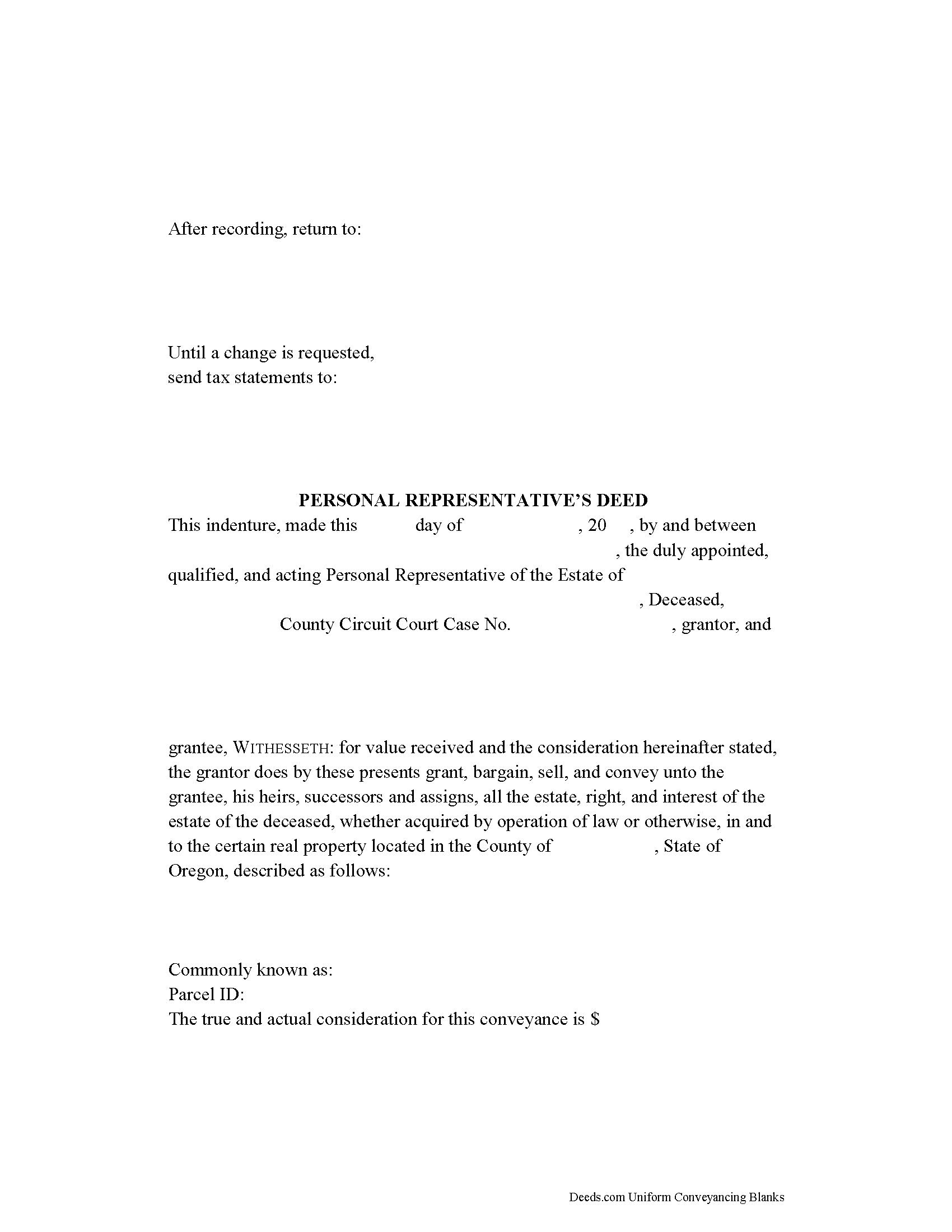
A personal representative's deed is a probate instrument used to convey real property in estate administration. It is one in a class of fiduciary instruments that is named after the capacity of the executing party.
A personal representative is the fiduciary assigned by the district court to administer a decedent's estate through the granting of letters (testamentary or of administration, depending on the testacy status of the decedent). Unless otherwise provided in the decedent's will, the PR has the power to sell or convey real property without a hearing, excepting certain circumstances (ORS 114.325).
A PR must execute a deed in order to distribute real property from the estate pursuant to a judgment of final distribution. A PR may also be used to carry out a sale. The sale of real property may be necessary to pay spousal support, child support, the elective share of the surviving spouse, or claims and expenses of administration.
When signed by the executing PR and acknowledged in the presence of a notary public, the PR deed transfers all the decedent's interest in the subject property at the time of his or her death to the purchaser or successor in interest. When record... More Information about the Oregon Personal Representative Deed
Notice of Completion
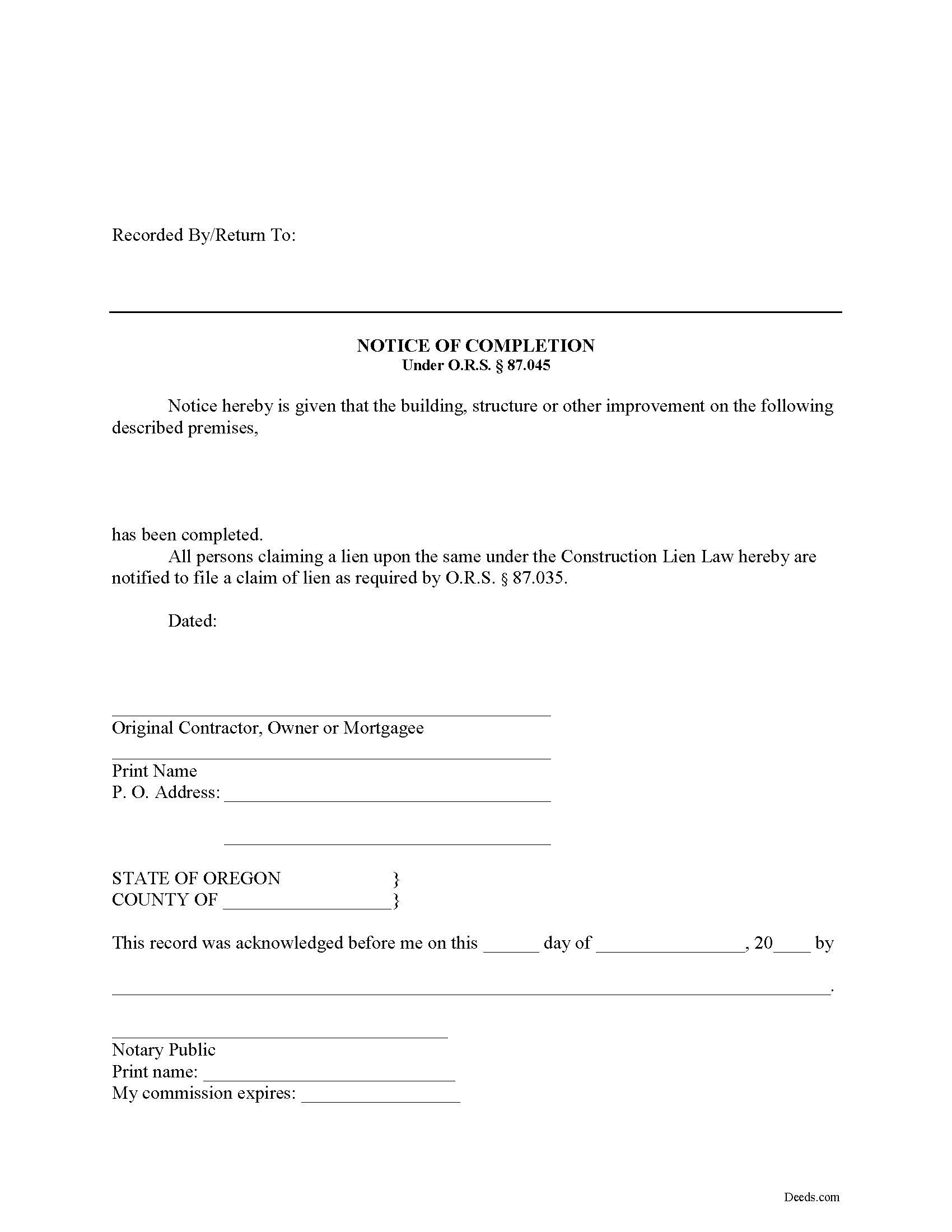
Oregon's Construction Lien Law is codified at ORS 87.001 to 87.060 and 87.075 to 87.093.
Property owners and other interested parties who contract for construction work need to be vigilant and ensure that their property remains free from a mechanic's lien, especially those of any "hidden" lien claimants that may be working under another party and the owner is unaware. Therefore, an owner should draft, record, and post at a job site, a Notice of Completion, upon the jobs completion, because a lien must be perfected no later than 75 days after the project has ended or been abandoned.
In Oregon, a construction project is deemed complete when (a) the improvement is substantially complete; (b) a completion notice is posted and recorded; or (c) the improvement is abandoned. O.R.S. 87.045(1).
When all original contractors employed on the construction of the improvement have substantially performed their contracts, any original contractor, the owner or mortgagee, or an agent of any of them may post and record a completion notice. O.R.S. 87.045(2). The completion notice must include a legal description of the property, the date the notice was sent, and the signer's name and addr... More Information about the Oregon Notice of Completion
Notice of Right to Lien
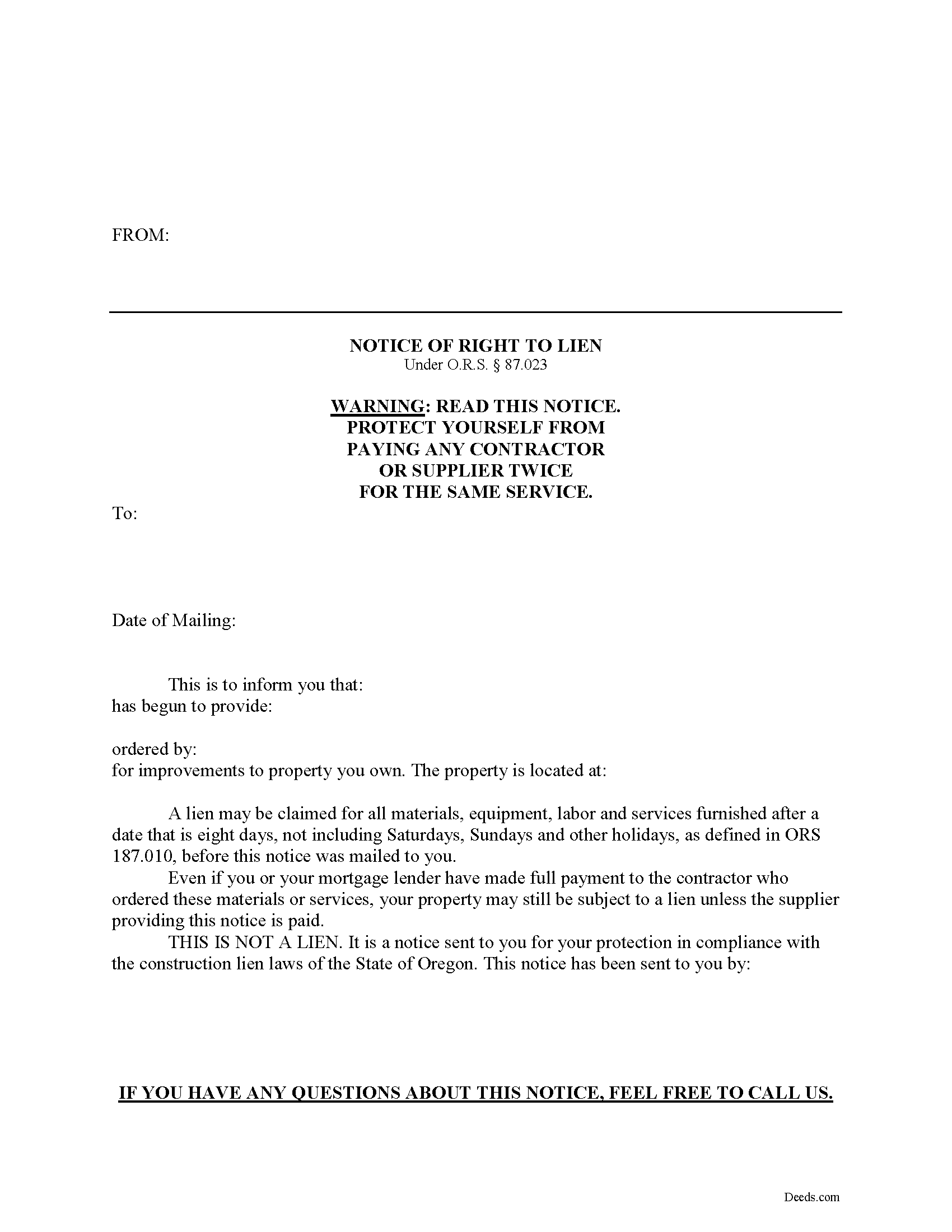
Preliminary Notice in Oregon -- Notice of Right to Lien
Oregon's Construction Lien Law is codified at ORS 87.001 to 87.060 and 87.075 to 87.093.
"Except for when material, equipment, services or labor is furnished at the request of the owner, a person furnishing any materials, equipment, services or labor for which a lien may be perfected, must give a notice of right to a lien to the owner of the site." O.R.S. 87.021(1). In Oregon, this means that contractors must send a property owner a preliminary notice if they ever intend on later filing of a mechanic's lien. Even if they don't anticipate needing a lien, it's generally good practice to send out such notices.
The notice of right to a lien may be given at any time during the work, but the notice only protects the right to perfect a lien for materials, equipment and labor or services provided after a date which is eight days, not including Saturdays, Sundays and other holidays, before the notice is delivered or mailed. Id.
The Notice includes the following information: (1) name and address of the lien claimant, (2) name and address of the property owner, (3) description of services, materials, or equipment furnished, ... More Information about the Oregon Notice of Right to Lien
Claim of Lien
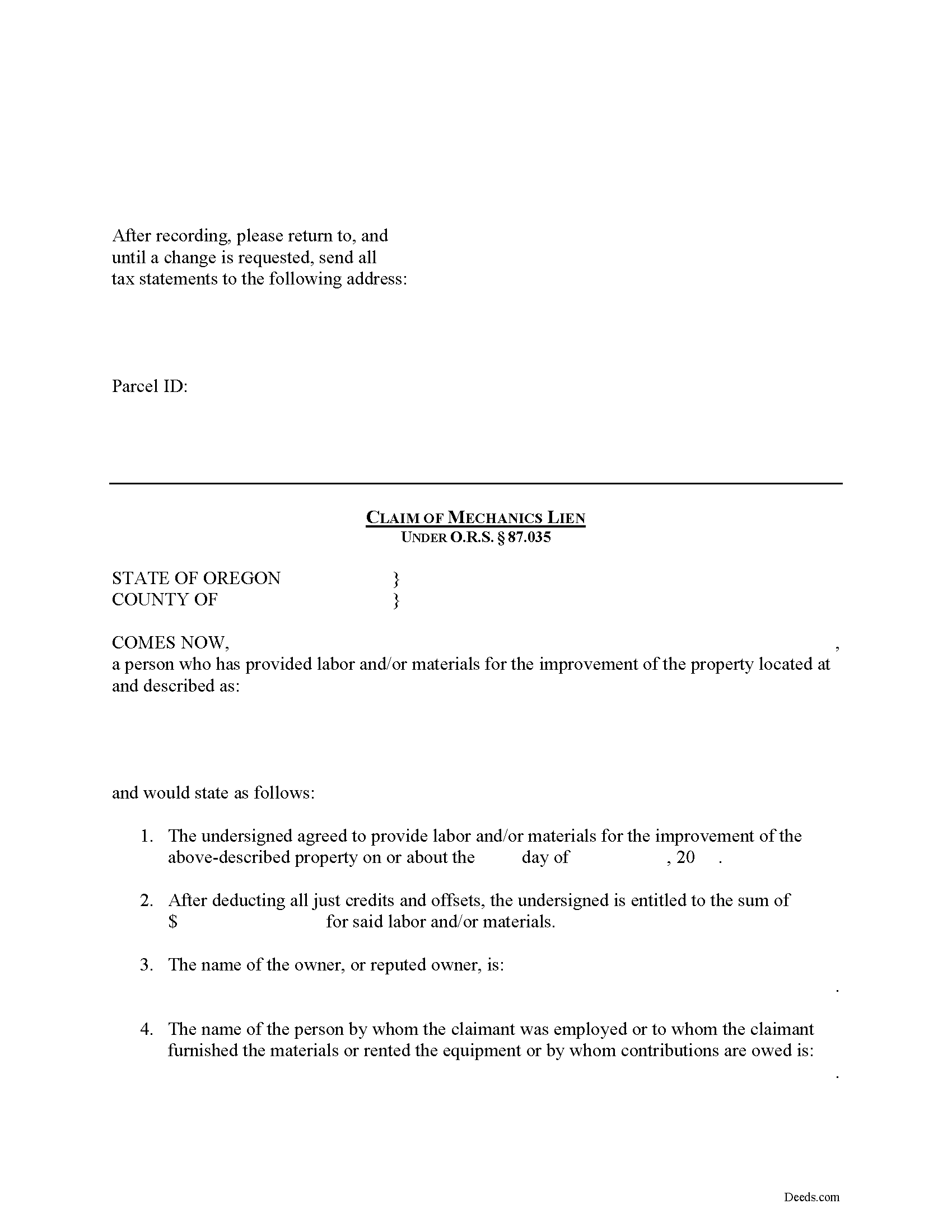
Mechanic's Lien Claims in Oregon
Oregon's Construction Lien Law is codified at ORS 87.001 to 87.060 and 87.075 to 87.093.
Contractors, subcontractors, and material suppliers can often have problems getting paid by property owners or other parties involved in the chain of dealings. Luckily, there is a remedy for these persons known as a construction lien. A construction lien works like a mortgage by creating a security interest in the title to real property as a form of collateral. A contractor or other party holds this interest and in turn can foreclose on it to force payment.
In Oregon, any person performing labor upon, transporting or furnishing any material to be used in, or renting equipment used in the construction of any improvement is entitled to a lien upon the improvement for the labor, transportation or material furnished or equipment rented at the instance of the owner of the improvement or the construction agent of the owner. O.R.S. 87.010(1). To claim a lien, the party providing labor or furnishing materials must first send a preliminary notice to the owner, in the form of a Notice of Right to a Lien, within 8 days of such furnishing. O.R.S. 87.021(1). The pu... More Information about the Oregon Claim of Lien
Conditional Lien Waiver on Progress Payment
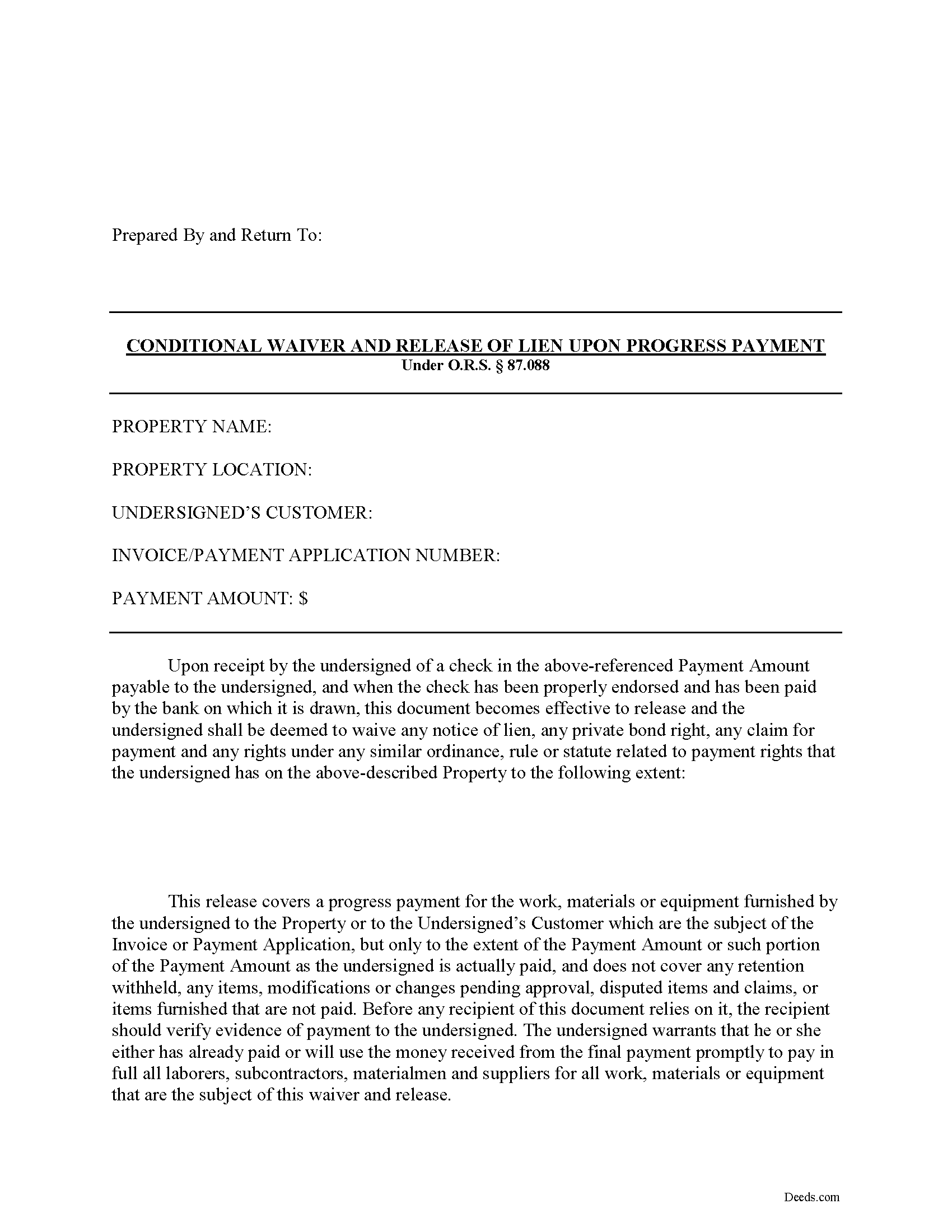
Oregon's Construction Lien Law is codified at ORS 87.001 to 87.060 and 87.075 to 87.093.
Liens are instruments, recorded with the land records for the locality where the relevant real property is situated, that document the agreement between the owner/customer and the contractor. They identify the primary parties and generally include a description of the work requested, a tentative schedule, and an information about charges and payments.
Contractors and other authorized parties (claimants) use construction liens to protect their interests while improving someone else's property. To encourage payment, the contractor may offer to waive lien rights up to a certain date or dollar amount.
Altogether, there are four separate lien waivers: partial conditional, partial unconditional, final conditional, and final unconditional. A conditional waiver offers more protection to the lien claimant, and depends on the payment clearing the bank, meaning that there are no bounced checks or other complications. An unconditional waiver offers more protection to the owner and is effective regardless of payment receipt.
For example, let's say a customer makes a payment toward the total ba... More Information about the Oregon Conditional Lien Waiver on Progress Payment
Unconditional Lien Waiver on Progress Payment
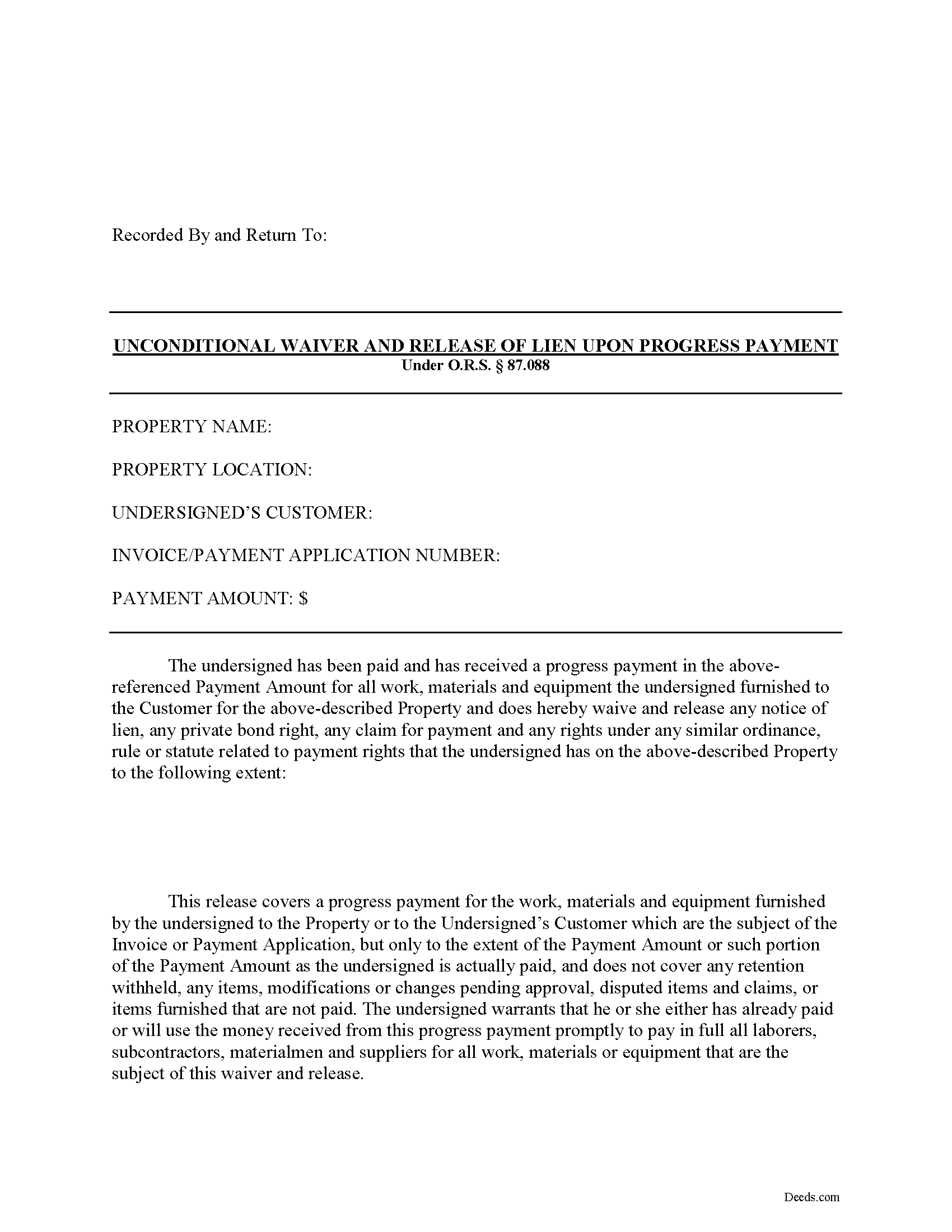
Oregon's Construction Lien Law is codified at ORS 87.001 to 87.060 and 87.075 to 87.093.
Liens are instruments, recorded with the land records for the locality where the relevant real property is situated, that document the agreement between the owner/customer and the contractor. They identify the primary parties and generally include a description of the work requested, a tentative schedule, and an information about charges and payments.
Contractors and other authorized parties (claimants) use construction liens to protect their interests while improving someone else's property. To encourage payment, the contractor may offer to waive lien rights up to a certain date or dollar amount.
Altogether, there are four separate lien waivers: partial conditional, partial unconditional, final conditional, and final unconditional. A conditional waiver offers more protection to the lien claimant, and depends on the payment clearing the bank, meaning that there are no bounced checks or other complications. An unconditional waiver offers more protection to the owner and is effective regardless of payment receipt.
For example, let's say a customer makes a payment toward the total ba... More Information about the Oregon Unconditional Lien Waiver on Progress Payment
Conditional Lien Waiver on Final Payment
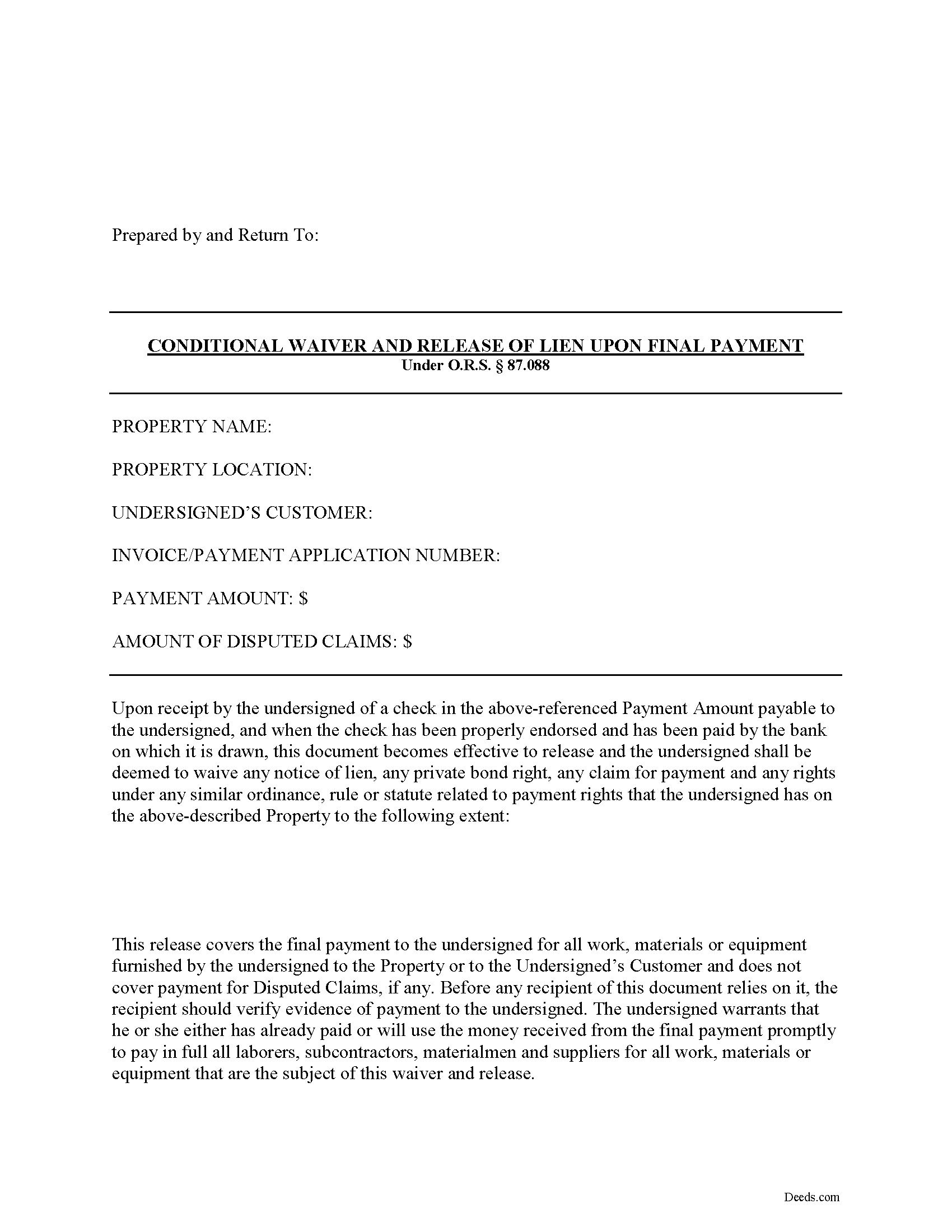
Oregon's Construction Lien Law is codified at ORS 87.001 to 87.060 and 87.075 to 87.093.
Liens are instruments, recorded with the land records for the locality where the relevant real property is situated, that document the agreement between the owner/customer and the contractor. They identify the primary parties and generally include a description of the work requested, a tentative schedule, and an information about charges and payments.
Contractors and other authorized parties (claimants) use construction liens to protect their interests while improving someone else's property. To encourage payment, the contractor may offer to waive lien rights.
Altogether, there are four separate lien waivers: partial conditional, partial unconditional, final conditional, and final unconditional. A conditional waiver offers more protection to the lien claimant, and depends on the payment clearing the bank, meaning that there are no bounced checks or other complications. An unconditional waiver offers more protection to the owner and is effective regardless of payment receipt.
For example, let's say a customer pays the total balance due. After the payment clears the bank, the claima... More Information about the Oregon Conditional Lien Waiver on Final Payment
Unconditional Lien Waiver on Final Payment
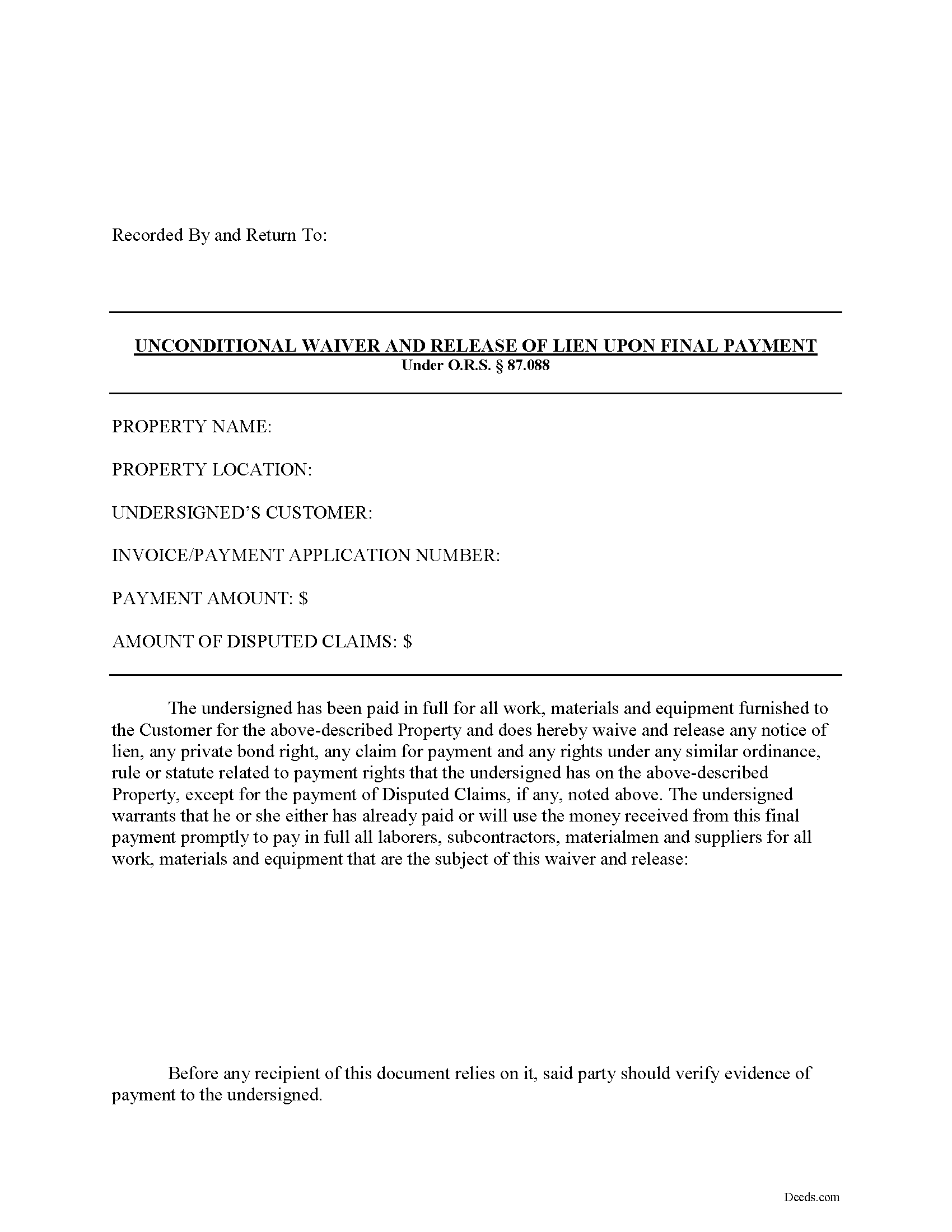
Oregon's Construction Lien Law is codified at ORS 87.001 to 87.060 and 87.075 to 87.093.
Liens are instruments, recorded with the land records for the locality where the relevant real property is situated, that document the agreement between the owner/customer and the contractor. They generally include a description of the work requested, a tentative schedule, and an information about charges and payments.
Contractors and other authorized parties (claimants) use construction liens to protect their interests while improving someone else's property. To encourage payment, the contractor may offer to waive lien rights up to a certain date or dollar amount.
Altogether, there are four separate lien waivers: partial conditional, partial unconditional, final conditional, and final unconditional. A conditional waiver offers more protection to the lien claimant, and depends on the payment clearing the bank, meaning that there are no bounced checks or other complications. An unconditional waiver offers more protection to the owner and is effective regardless of payment receipt.
For example, let's say a customer pays the total balance due. The contractor then releases the rights ... More Information about the Oregon Unconditional Lien Waiver on Final Payment
Disclaimer of Interest
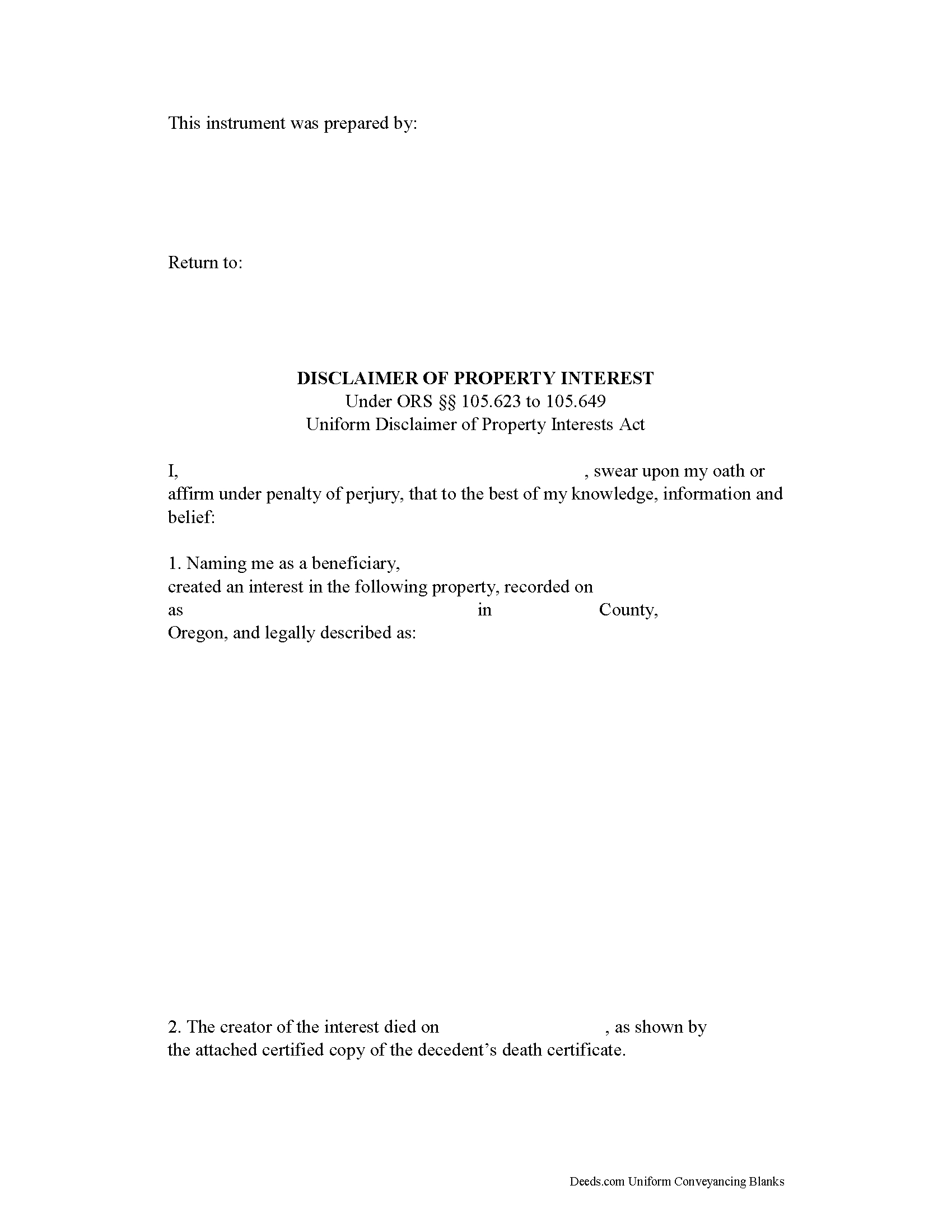
As part of the Oregon Revised Statutes, the beneficiary of an interest in property may renounce the gift, either in part or in full (ORS 105.623 to 105.649 Uniform Disclaimer of Property Interests Act). Note that the option to disclaim is only available to beneficiaries who have not acted in any way to indicate acceptance or ownership of the interest ( 105.623).
The disclaimer must be in writing and include a description of the interest, a declaration of intent to disclaim all or a defined portion of the interest, and be signed by the disclaimant ( 105.629 (3)).
Deliver the disclaimer within nine months of the transfer (e.g., the death of the creator of the interest) to the personal representative of the decedent's estate, the trustee or file it with the court having authority to appoint such a person with the probate court of the county that has jurisdiction over proceedings regarding the estate of the deceased donor. In addition, deliver a copy of the disclaimer in person or send it by registered mail to any personal representative or other fiduciary of the decedent's estate ( 105.642). If the transfer was enacted by an instrument other than a will, deliver a copy of th... More Information about the Oregon Disclaimer of Interest
Certificate of Trust
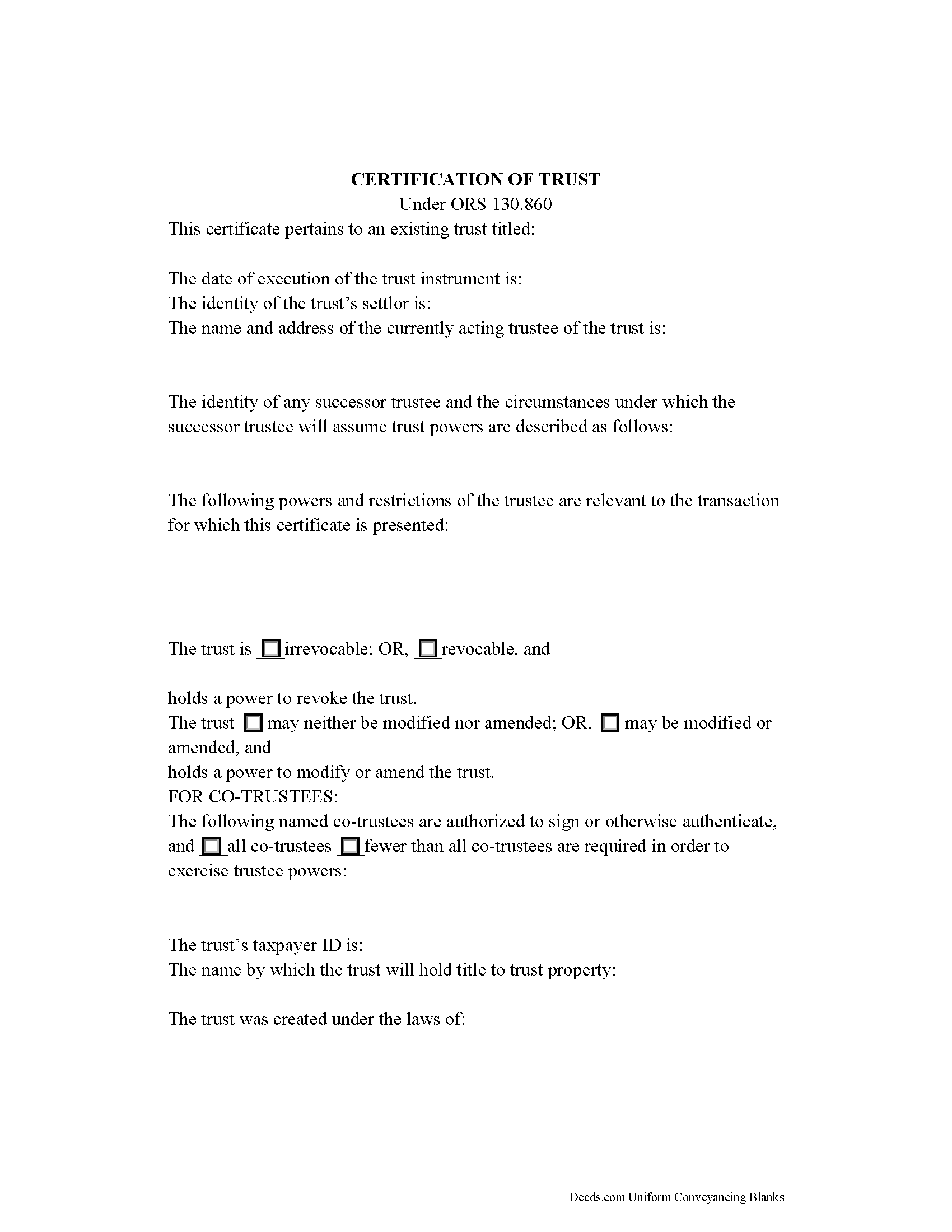
Oregon Certification of Trust for Real Property Transactions
A trust is an arrangement whereby a person (the settlor or trustor) transfers property to another person, a trustee, who manages the assets for the benefit of a third (the beneficiary), pursuant to the terms established by the settlor in the trust instrument. Living trusts in Oregon are governed by the Uniform Trust Code, codified at Chapter 130 of the Revised Statutes.
When engaging in business with a trustee, parties to the transaction can request that the trustee provide a certification of trust. To allow the settlor to keep his estate plans private, the trust instrument is generally not recorded, and the trustee uses the certification of trust in the place of disclosing the entire contents of the trust instrument. The certification of trust, presented to anyone who is not a trust beneficiary, contains the essential information about the trust required for the pending or contemplated transaction, certifying its existence and the trustee's authority to do business as fiduciary.
The statutory requirements for a certification of trust are located at ORS 130.860. The certificate must state that the trust exists (g... More Information about the Oregon Certificate of Trust